#and people seem less likely to view it in a binary or restrictive way based on older understandings
Text
For pride month lets give all our love to transvestites and transsexuals! Fuck identity police who try tell you you're not "allowed" to identify with these words because they're "outdated". Transvestites and transsexuals founded the trans movement, these words are our words as a community and people get to choose what they mean to them.
Transvestites are amazing and deserving or love and respect!
Transsexuals are awesome and deserving of love and respect!
Happy pride to transvestites and transsexuals!
#pride#happy pride#trans rights#transgender#transvestite#transsexual#transsexual as a label has been having a renaissance lately it feels like#and people seem less likely to view it in a binary or restrictive way based on older understandings#I hope the same can happen for transvestite#anyway happy pride to all trans people
2K notes
·
View notes
Note
Hey girl. I’m a 21 year old cis woman, so roughly the same age as you. This could be a long one so I apologize in advance. I hope this doesn’t come across as patronizing or rude, I come from a place of kindness. I, like you, have chosen to be a feminist and uplift women and women’s voices and lives. But it seems you’ve chosen a path that differs from my own, and I don’t think you realize how you, yourself, are upholding the patriarchy. It’s true that gender identity is a social construct, and modern day gender identities rely on the patriarchy to exist. But they are also deeply rooted in colonialism. Gender and sex have been different for a very very long time, and many cultures before colonization embraced many different sex and gender identities free from modern day patriarchal concepts. What you’ve been told about sex and gender are rooted in patriarchal understandings of sex. The modern day understanding of sex NEEDS the patriarchy, to exist. Sex is a spectrum, the two ends being male and female. The patriarchy wants just male and female, so one can be superior to the other based on ancient (and white) societal concepts. With a wider range of sex identities, less men exist, and it becomes harder to be superior. I encourage you to take a look at how other cultures viewed women, and people of other genders, before colonization. It wasn’t all “women are lesser to men,” that’s just what most people learn because that’s what upholds the patriarchy. As a woman, I understand your fear of men invading our spaces to hurt us. But trans women are not going to do that, the process of transitioning is long and complicated and I encourage you to learn more about it. By putting down transgender people you are ultimately siding with the very men who do want to hurt you, and they want to hurt transgender people too. The people restricting abortion rights, divorce rights, all womens rights, are the same people restricting trans rights. Have you never stopped to think why that is? It’s because they go against the patriarchy, the societal norm. You and I will never be free while we put down other minority groups. We must focus on the true goal of eliminating the patriarchy and this war against trans people is a distraction. I promise you, if a man wanted to invade the spaces of women, they would not go through years of hormone replacement, put on women’s clothing, grow out their hair, and act/talk feminine to do so. You and I both know they just have to walk in. I implore you, talk to some trans people there are many on this platform. Interact with biologists to learn about human sex and gender and how they work, both are so interesting and complex it’s a real shame we learn none of it. I hope one day things get better for both of us.
I respect your effort, but you underestimate the amount of research I‘ve done and experience I‘ve gained. I‘m familiar with transgenderism and trans rights activism as I used to be part of the movement.
Gender critical feminists don‘t side with (conservative) men. Whilst it might superficially seem that way (critical of trans ideology), these men want to stick to traditional gender roles & stereotypes whereas we want to abolish it altogether.
Sex is not a spectrum. Sex is dichotomous. You‘re either biologically male or female. Intersex people are often used as "evidence" for the claim that sex isn‘t binary, but what your community likes to leave out is that intersex people are still either male or female (intersex male & intersex female). Disorders of sexual development and sexual dimorphism are not the same as transgenderism, which is entirely based on gender (a patriarchal construct).
There are already examples of transitioned men who use their gender identity to enter women‘s spaces, including prisons, and men who transition during their prison sentences.
Regardless, self-ID laws are dangerous and whether a man is truly dysphoric or not doesn’t justify putting women at risk, especially since 'transwomen' are statistically just as prone to male pattern violence as men who aren‘t trans.
Dysphoria is a psychological condition and should be treated accordingly. That doesn’t mean anyone has to stick to traditional gender roles — just be yourself and do what you want, wear dresses, use makeup etc. — or don’t — but don’t call yourself a woman when you‘re male & don‘t invade women‘s spaces when you‘re male.
#radfem#radblr#radical feminism#feminism#radfems do touch#radfems do interact#women deserve better#radfems please touch#womens rights#sex based rights#transgender#terfblr
49 notes
·
View notes
Link
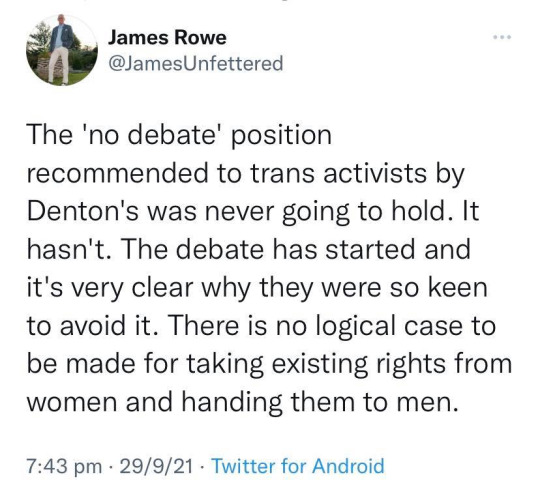
A great deal of the transgender debate is unexplained. One of the most mystifying aspects is the speed and success of a small number of small organisations in achieving major influence over public bodies, politicians and officials. How has a certain idea taken hold in so many places so swiftly?
People and organisations that at the start of this decade had no clear policy on or even knowledge of trans issues are now enthusiastically embracing non-binary gender identities and transition, offering gender-neutral toilets and other changes required to accommodate trans people and their interests. These changes have, among other things, surprised many people. They wonder how this happened, and why no one seems to have asked them what they think about it, or considered how those changes might affect them.
Some of the bodies that have embraced these changes with the greatest zeal are surprising: the police are not famous social liberals but many forces are now at the vanguard here, even to the point of checking our pronouns and harassing elderly ladies who say the wrong thing on Twitter.
How did we get here? I think we can discount the idea that this is a simple question of organisations following a changing society. Bluntly, society still doesn’t know very much about transgenderism. If you work in central London in certain sectors, live in a university town (or at a university) or have children attending a (probably middle-class) school, you might have some direct acquaintance. But my bet is that most people don’t know any trans people and don’t have developed views about how the law should evolve with regards to their status.
So the question again: how did organisations with small budgets and limited resources achieve such stunning success, not just in the UK but elsewhere?
Well, thanks to the legal website Roll On Friday, I have now seen a document that helps answer that question.
The document is the work of Dentons, which says it is the world’s biggest law firm; the Thomson Reuters Foundation, an arm of the old media giant that appears dedicated to identity politics of various sorts; and the International Lesbian, Gay, Bisexual, Transgender, Queer and Intersex Youth & Student Organisation (IGLYO). Both Dentons and the Thomson Reuters Foundation note that the document does not necessarily reflect their views.
The report is called 'Only adults? Good practices in legal gender recognition for youth'. Its purpose is to help trans groups in several countries bring about changes in the law to allow children to legally change their gender, without adult approval and without needing the approval of any authorities. 'We hope this report will be a powerful tool for activists and NGOs working to advance the rights of trans youth across Europe and beyond,' says the foreword.
As you’d expect of a report co-written by the staff of a major law firm, it’s a comprehensive and solid document, summarising law, policy and 'advocacy' across several countries. Based on the contributions of trans groups from around the world (including two in the UK, one of which is not named), it collects and shares 'best practice' in 'lobbying' to change the law so that parents no longer have a say on their child’s legal gender.
In the words of the report:
“'It is recognised that the requirement for parental consent or the consent of a legal guardian can be restrictive and problematic for minors.'
You might think that the very purpose of parenting is, in part, to 'restrict' the choices of children who cannot, by definition, make fully-informed adult choices on their own. But that is not the stance of the report.
Indeed, it suggests that 'states should take action against parents who are obstructing the free development of a young trans person’s identity in refusing to give parental authorisation when required.'
In short, this is a handbook for lobbying groups that want to remove parental consent over significant aspects of children’s lives. A handbook written by an international law firm and backed by one of the world’s biggest charitable foundations.
And how do the authors suggest that legal change be accomplished?
I think the advice is worth quoting at length, because this is the first time I’ve actually seen this put down in writing in a public forum. And because I think anyone with any interest in how policy is made and how politics works should pay attention.
Here’s a broad observation from the report about the best way to enact a pro-trans agenda:
“'While cultural and political factors play a key role in the approach to be taken, there are certain techniques that emerge as being effective in progressing trans rights in the "good practice" countries.'
Among those techniques: 'Get ahead of the Government agenda.'
What does that mean? Here it is in more detail:
“'In many of the NGO advocacy campaigns that we studied, there were clear benefits where NGOs managed to get ahead of the government and publish progressive legislative proposal before the government had time to develop their own. NGOs need to intervene early in the legislative process and ideally before it has even started. This will give them far greater ability to shape the government agenda and the ultimate proposal than if they intervene after the government has already started to develop its own proposals.'
That will sound familiar to anyone who knows how a Commons select committee report in 2016, which adopted several positions from trans groups, was followed in 2017 by a UK government plan to adopt self-identification of legal gender. To a lot of people, that proposal, which emerged from Whitehall looking quite well-developed, came out of the blue.
Anyway, here’s another tip from the document: 'Tie your campaign to more popular reform.'
For example:
'In Ireland, Denmark and Norway, changes to the law on legal gender recognition were put through at the same time as other more popular reforms such as marriage equality legislation. This provided a veil of protection, particularly in Ireland, where marriage equality was strongly supported, but gender identity remained a more difficult issue to win public support for.'
I’ve added my bold there, because I think those are very telling phrases indeed. This is an issue that is 'difficult to win public support for' and best hidden behind the 'veil of protection' provided by a popular issue such as gay rights. Again, anyone who has even glanced at the UK transgender debate will recognise this description.
Another recommendation is even more revealing: 'Avoid excessive press coverage and exposure.'
According to the report, the countries that have moved most quickly to advance trans rights and remove parental consent have been those where the groups lobbying for those changes have succeeded in stopping the wider public learning about their proposals. Conversely, in places like Britain, the more 'exposure' this agenda has had, the less successful the lobbying has been:
'Another technique which has been used to great effect is the limitation of press coverage and exposure. In certain countries, like the UK, information on legal gender recognition reforms has been misinterpreted in the mainstream media, and opposition has arisen as a result. ….Against this background, many believe that public campaigning has been detrimental to progress, as much of the general public is not well informed about trans issues, and therefore misinterpretation can arise.
In Ireland, activists have directly lobbied individual politicians and tried to keep press coverage to a minimum in order to avoid this issue.' (Emphasis added).
Although it offers extensive advice about the need to keep the trans-rights agenda out of the public’s gaze, the report has rather less to say about the possibility that advocates might just try doing what everyone else in politics does and make a persuasive argument for their cause. Actually convincing people that this stuff is a good idea doesn’t feature much in the report, which runs to 65 pages.
I’m not going to tell you what I think of the report, or the agenda it sets out. I’m not going to pass comment on it or its authors. I’m just going to try to summarise its nature and contents.
A major international law firm has helped write a lobbying manual for people who want to change the law to prevent parents having the final say about significant changes in the status of their own children. That manual advises those lobbying for that change to hide their plans behind a 'veil' and to make sure that neither the media nor the wider public know much about the changes affecting children that they are seeking to make. Because if the public find out about those changes, they might well object to them.
I started my first job as a researcher in the Commons in 1994. I’ve been studying and writing about politics and policy ever since. And in my experience of how changes in the law are brought about, the approach described in that report is simply not normal or usual. In a democracy, we are all free to argue for whatever policy or position we wish. But normally, anyone who wants to change the law accepts that to do so they need to win the support or, at least, the consent of the people whose authority ultimately gives the law its force. The approach outlined, in detail, in the Dentons report amounts to a very different way of lobbying to get the laws and policies you want. Even more notably, it suggests that in several countries people have been quite successful in lobbying behind a 'veil' and in a way that deliberately avoids the attention of the public. That, I think, should interest anyone who cares about how politics and policy are conducted, whether or not they care about the transgender issue.
I’m going to conclude with an observation I’ve made here before, but which I think bears repeating in the context of that report and the things it might tell people about other aspects of the trans issue: no policy made in the shadows can survive in sunlight.
4 notes
·
View notes
Text
Pansexuality, Bisexuality, Asexuality, and experiencing sexual attraction towards a person regardless of gender...
Alright you guys, here’s the thing.
I’m seeing a lot of hurt, resentment, and misunderstanding in the pansexuality tag, coming primarily from pansexuals and bisexuals alike, and I think it’s high time we sat the fuck down together, and had a good heart-to-heart as a community.
Actually, I’m inviting asexuals to the table, too, because they happen to be much closer to a specific subset of pansexuality than a lot of people seem to believe, and might be able to offer valuable input and insight into that whole debate.
First, I know there are a lot of different views, versions, and definitions of what pansexuality is. Some identify as being sexually attracted to all gender expressions, others as being sexually attracted to people regardless of gender.
Here, I’m going to address what “regardless of gender” actually entails in terms of how one experiences sexual attraction towards another person without regard to their gender. This is the definition of pansexuality that I wish to delve into and explore, so hopefully we may gain a broader perspective of why some of us feel that having a distinct space within the LGBTQ+ community matters.
First off, here is an especially important concept that does not seem to be well integrated for many people:
What orients human sexuality is not restricted to gender.
I repeat: What orients human sexuality is not restricted to gender.
What does it mean?
This means that every human being that do experience sexual attraction towards another human being does so according to a huge multitude of personal criteria that they perceive in another human being that - when combined together – trigger that sense of sexual attraction, and lets us perceive a person as being sexually attractive.
When we say that someone is "hot" and that “we want them"; usually, it is because there is that *special something* about the way they act, the way they move, the depth of their voice, the sound of their laughter, the mischievous glint in their eyes, their overall projected personality, how they carry themselves, their height, their weight, their confidence, their vulnerability, the shape of their forehead, their nose, the texture of their hair, the roundness of their buttocks, the culture they belong to, their intellect, etc., that is perceived as being sexually desirable traits to be found in a “mate”.
Some of these perceived traits tend to carry more weight, and thus will be taken into consideration, more than others.
However, assuming we are not asexual, we all sexually respond to an array of perceived physical, emotional, psychological, spiritual, intellectual, etc. features we see in another human being that makes us go "Yup! I wanna have the sex with you!"
For the vast majority of people, gender tends to be what they assess first - something that is significant enough to orient their sexuality - or that is, at least, perceived as being significant in some way.
For example, they will see a woman with luscious red hair, a gorgeous smile, an aura of authenticity, a resonant laughter, a soft, curvy body, freckles, a shy gaze yet a very firm and assured handshake, and their body will respond to said woman in a way that awakens some desire in them. They will want to have sex with that woman, and they will typically appreciate that she is a woman while doing so.
Some will have a preference for cisgender or transgender women, but for the purpose of the issues I’m wishing to bring into light, please always assume that whenever I am referring to a woman or a man, this includes both cisgender and transgender individuals.
This is crucially important. Because I’ve sadly seen many people claiming that they are “pansexual” because they like every gender, even “transgenders”, while arguing that bisexuals only like “cisgender men and women”, and that makes absolutely no sense.
By doing so, you are pretending that your sexuality is “more inclusive” towards multiple gender identities, while at the same time pretending that, in order to be bisexual, a transgender woman would need to feel no sexual attraction towards other transgender men, and/or women of her own gender.
You are unwittingly relegating transgender individuals to the role of being someone else’s object of sexual desire, while not giving them the role of being the ones expressing that desire in how they identify.
The gender is “woman”. The gender is “man”. The gender is “non-binary”. The (absence of) gender is “agender”.
You absolutely have the right to be exclusively sexually oriented towards men whose assigned gender at birth (usually determined by their genitalia) matches their gender identity.
But that is a personal preference of yours in “how you like your men”.
I know quite a few girls that are not sexually attracted to men that are smaller than themselves, and yet they are still heterosexual or bisexual.
Preferring someone whose gender matches the gender they were assigned at birth based on their genitalia is nothing wrong.
Pretending that transgender men and women should be excluded from the definition of bisexuality based on being transgender, is. It reflects a failure to acknowledge that transgender men and women are the same gender as cisgender men and women.
So, everywhere you see me refer to “men” and “women”, please do assume that it includes both cisgender and transgender individuals. Whenever I am talking about a specific interest in certain types of genitalia (that are associated with the gender assigned at birth vs the gender identity of a person), I will make that precision.
Otherwise men and women are men and women, period.
That being said, to go back to the notion of all the different variables influencing our sexual orientation, I believe that in order to properly understand the nuance found in pansexuality, it would be helpful to take a good look at an asexual’s experience of their own sexuality.
When people hear “asexual”, they often make the mistake of assuming that everyone that identifies as asexual are sex-repulsed, or that they can’t find pleasure in the act of sharing sex with a partner, romantic or otherwise.
All that asexuality means, really, is that the person is not sexually attracted towards other people.
It says absolutely nothing about an inability to experience sexual arousal and enjoy an active, satisfying sex life.
What it tells you, is that other people won’t be what will trigger the desire in them to have sex.
Let’s say you love ice cream!
Most of the time, you eat ice cream on your own, because you crave how good it tastes and enjoy eating ice cream for the ice cream itself.
It relaxes you, makes you feel good, and is very self-gratifying.
The sight of another person holding an ice cream cone, or even explicitly offering it to you, does not make you want to eat ice cream, however. Your cravings for ice cream happen totally independently of how other people behave about ice cream, about you, and are not tied to the social aspect of enjoying ice cream with a partner.
You’re fine managing your ice cream eating habits on your own.
HOWEVER, sometimes, when you are with someone you strongly care about and trust, even if their presence changes nothing to your own impulses to desire eating ice cream, since eating ice cream *is* something you find personally pleasurable, you may find yourself wanting to share that pleasure with them.
You might even be open to spoon-feeding them the ice cream yourself. Not because you are instinctively driven to eat ice cream in the company of another and share it, but because you do enjoy the whole aspect of togetherness, and the strengthening of social bonds that eating ice cream together brings you.
For sexually active asexuals, “sharing sex” with someone is often something that they will willingly engage in because they are very receptive to the feelings of intimacy and togetherness that engaging in sexual activity with someone they deeply care about - or might even be romantically engaged with - brings them.
It becomes something that is sought as a way to reinforce such social bonds, rather than an instinctive drive to have sex based on a desire that is triggered by a partner.
A human being can desire to bond with another person through something that leaves them as vulnerable and open as sexual intercourse, without perceiving the person they choose to have sex with as being sexually desirable themselves.
What will happen is that they will find ways to sexually arouse themselves through tactile stimulation, certain thoughts, and/or other ways – often rather unique to them – that they have experienced with, and they know can trigger a state of sexual arousal in themselves.
Once sexually aroused, they are free to enjoy the sexual activity in the company of someone that they care about.
In the context of a romantic relationship, there is also the aspect of empathy, of desiring to make someone they love feel good, and happy.
But the acceptance and understanding that an asexual does not sexually desire their romantic partner, and thus respecting their own limits and comfort zone in terms of how much sex they are willing and comfortable to share with a sexual partner, is absolutely crucial.
They do get something out of it, too (i.e. it’s not JUST about making the other feel better). But the drive to “eat ice cream together” may be less than in someone that sees “ice cream” in someone else’s hands, and can barely contain their excitement and need to eat some.
Some asexuals do not ever feel comfortable having sex with other people, and that is perfectly ok, too.
But being asexual, in the context of a sexual orientation, doesn’t automatically mean being unable to sexually engage in sexual activity with others, being repulsed by it, and/or finding nothing rewarding in having sex with others.
It just means that other people are not something that orients their sexuality, and that they don’t trigger anything in them that makes them want to have sex with them. At least, not without some secondary objective (ex: fostering a greater sense of emotional intimacy) in mind.
An asexual’s sexuality can be expressed regardless of the person.
If you can understand that, then you might understand how being pansexual feels.
As a pansexual, I experience sexual attraction to a person, but said attraction occurs regardless of that person’s gender.
I do not find women sexually desirable. I do not find men sexually desirable. I do not find non-binary gender identities sexually desirable. I do not find agenders sexually desirable.
I can listen to a bisexual trying to explain to me what they find sexually exciting about girls, boys, agenders, etc. using terms to describe certain gendered traits.
Except I am unable to personally relate to any of the feelings they are describing.
Not because I am gender blind.
I do see your gender.
Just like I do see how tall you are, what your body type is, your hair color, your nose, etc.
And yet, people do not typically go around insisting on defining sexual orientation in terms of:
- Heterosexuality: being sexually attracted to people with different hair colors than yours.
- Homosexuality: being sexually attracted to people with the same hair color as you.
- Bisexuality: being sexually attracted to both people with different hair colors than your own (experiencing patterns of heterosexual attraction), and the same hair color as you (experiencing patterns of homosexual attraction).
- Pansexuality: Being sexually attracted to a person regardless of hair color, without experiencing any patterns of either heterosexual or homosexual attraction.
They do, however, keep insisting that another human being’s gender is one of the many traits they have - that may or may not outwardly be express - that should make you feel “something” about them.
Gender is supposed to be one of the key factors of sexual attraction that orients one’s sexuality.
But that is not always the case. My body, my sexual impulses, instincts, or drive - no matter how you wish to call it - do not respond to gender.
And insisting that I should find anything about one being a woman, a man, or otherwise sexually attractive quickly becomes irritating.
If I were to live in a world where hair color was perceived as playing an important role in someone’s likeliness to find a person sexually attractive – and people were persecuted and discrimated against based on the hair colors they found themselves sexually attracted to – I wouldn’t feel it would be any different than the sexual orientation system we’re stuck in right now.
In terms of the genitalia that is traditionally associated with the gender assigned at birth, or even reassigned genitalia, I do not find anything remotely sexually interesting about vaginas and penises (and all their variations).
Yes, they are physically there, I can use them in the context of sexual intercourse, but they don’t offer anything more stimulating or interesting to me than what could be achieved with the use of fingers, a tongue, and/or especially toys (toys are notoriously difficult to beat in terms of functionality and versatility, actually).
Your genitalia is not about me, but about you. I do not find your penis or your vagina sexually attractive. They are body parts that look rather weird and funny to me (I’m including my own vagina in that assessment), and I don’t get what’s supposed to be sexually stimulating or interesting about having the opportunity to see or interact with that part of someone else’s body.
I’m not repulsed by your genitalia, but they don’t inspire me to have sex, either…
…UNTIL I’ve been having sex with the same partner for long enough that I manage to generate mental associations between your vagina or your penis with other aspects of yourself that do trigger some sexual desires in me.
My sexuality is expressed in a way that is highly empathetic. So, as soon as I’m starting to truly bond with a partner and develop a long term connection with them, their own expression of sexual arousal will be an extremely strong trigger in terms of how sexually attractive they will look to me.
When I see my partner’s penis, it’s not the penis itself that I see. The image that will instinctively and automatically pop into mind is the way his body lightly trembles under my touch, it’s the delicious little quiet moans and sighs escaping his lips, it’s the hungry looks he gives me, it’s the intimacy and the vulnerability behind each action, it’s the light sheen of sweat covering his skin, the rise and fall of the chest as his breath quickens, the pulse on his neck beating increasingly fast.
Every penis in the world looks to me like an oversized big toe, and they are totally irrelevant to my sexual interests, except for being “instruments” that I can play to make my partner experience heightened sensations, and bring them sexual satisfaction…
And I can play with every instrument of origin and/or with every reassigned instrument… or none at all! If you’d rather use toys that you control by yourself, and have me interact with the rest of your body during sexual intercourse, instead, it’s 100% fine by me. I don’t need to get in direct contact with your genitalia to find sexual intercourse sexually satisfying, either.
As long as it remains something interactive we are sharing together, my pansexual arse will be perfectly fine!
But there comes a point where my partner’s penis no longer quite looks like “just a penis” to me - it looks like the whole experience of having sex with him.
And I’m sexually attracted to him. I’m sexually attracted to elements of his personality, yes, but also to his body.
A bubble butt remains a bubble butt, regardless of the gender it belongs to. And bubble butts are very sexually attractive.
You’ve got the bubble butt? In my own personal list of personal features likely to make me perceive you as sexually attractive, bubble butts rate very high.
So, while my partner’s penis does not orient my sexuality, and I could have done with or without. My sexual attraction towards other aspects of him (oh yeah, he’s got the bubble butt, alright!) allows me to embrace that part of his body as something “more” than “just a weird looking big toe that inflate and deflate”.
The way I feel about vaginas is pretty much the same. I don’t find them attractive or interesting, but since I’m interested in making my sexual partner feel good, too, over time I’ll learn to develop an appreciation for my own partner’s vagina.
Therefore, trying to argue that “biological sex” or genitalia should be perceived as “mattering more” or being “more relevant” in the context of describing how we experience sexual attraction towards a person than one’s hair color – and therefore, I should pay more attention to something that is traditionally being used to define gender upon birth than someone being a ginger – does not work with a pansexual that identifies as such, because they experience sexual attraction regardless of gender.
I’m not repulsed by your genitalia, I don’t desire it. What I need, what I want, is having someone close to me I can kiss, caress the curve of the small of their back, run my fingers through their hair, bite their shoulders, grab that bubble butt with both hands and feel those muscles offer some resistance against my fingers, etc.
A person’s overall body is what is perceived as being sexually attractive and will orient my sexuality. Their genitalia, or even specific gendered traits associated with their body, not so much.
Which brings me to the infamous question pansexuals keep being asked over, and over again every time they try to tell someone that they are sexually attracted to a person regardless of gender.
“Oh, so who they are, their personality, matters to you more than what’s between their legs or how they look?”
*NOISE OF RECORD BEING SCRATCHED. *
Alright, hold on. Are you telling me that if you remove “gender” from the equation, regarding what we can find attractive in another person, the only thing you’re left with becomes some utterly disembodied entity that is “all hearts and no parts”?
Are you telling me that gender is something so big, so powerful, that someone’s whole physical appearance become entirely swallowed by it?
Are you saying that gender has absolutely no bearings, or influence over one’s emotional, intellectual, spiritual, psychological traits?
If that is, indeed, what you are saying, how is it, then, that society keeps yapping about how men and women are supposed to think, what they are supposed to wear, what they are meant to like and dislike, what personality traits they are supposed to have and/or are more socially appropriate to express, and how their relationship dynamic is supposed to be build in terms of how male and females relate to each other?
Socially, I think we can agree that talks of gender tend to be quite prevalent, and generally, gender is an aspect being perceived as coloring every single aspect of a person…
And yet, if I’m telling you that I can be sexually attracted to a person regardless of their gender, are you really telling me that the only place where, suddenly, gender seems to be important, is in terms of what’s between the person’s leg, and how they physically LOOK?!
How does that work for you?
So, here is what appears to get really confusing for both the pansexual being asked the question, and the one asking it.
People that have a sexual orientation towards one, or even all genders, will tend to find aspects of someone being a woman, a man, non-binary, or even agender sexually attractive.
They may love all forms of possible genders expressions out there, and maybe even love them all equally and for the same overall reasons. Their body may experience sexual attraction towards men, women, and non-binary genders equally.
But there’s something about one’s gender they still perceive as being relevant and “hot” and they will notice as being sexually desirable in relation to gender.
They can read about what’s great about dating women, men, and non-binary (assuming they are also romantically attracted to certain people), or having sex with them, and personally connect with those feelings.
They might find penises and vaginas to be sexually interesting and stimulating, and the direct contact with a sexual partner’s genitalia will be something they enjoy, cherish, and naturally seek as being a significant pleasurable part of their sexual intercourse.
Their sexual instincts, their sexual drive, etc. does respond to the gender of their sexual partner.
A pansexual that experiences sexual attraction to a person regardless of gender does not experience such a response.
And, for those of you that are sexually sensitive to other people’s gender, it can apparently seem rather inconceivable that you can be totally dispassionate about gender when it comes to being in a sexual relationship with a partner.
Whether we are talking about a quick “one-night stand” type of encounter, or in the context of a long-term romance, gender is utterly irrelevant, and not an aspect of the other person that triggers any feelings of sexual attraction for pansexuals.
It doesn’t orient our sexuality. We have no sexual orientation and have never known what finding women, men, or other gender expressions sexually attractive feels like.
So, as we are saying “we experience sexual attraction to a person regardless of gender”, people that like one or many genders out there will naturally go for what feels familiar to them.
They try to understand how that can even be possible.
For many, especially those that feel strongly about having sex with specific gender(s), the key component associated with a person’s gender seems to be the genitalia and/or other physical traits that tend to be gendered in their eyes.
A woman will tend to have a body that is less muscular, a higher pitched voice, wear their hair longer more often, they have enlarged breasts and nipples, etc.
There is thus a natural association between “how someone looks” and “gender”.
To the pansexual, while they may “see” the elements of physical femininity and masculinity of a person’s body, their brain does not respond to those perceived “gendered traits” as something exciting or desirable.
It feels neutral, irrelevant, we do not understand why we are supposed to care about the difference between massaging a woman’s breast or a man’s chest within the context of sexual intercourse, or how it’s supposed to be really different.
Ok, yeah, there is a difference, but in terms of how my instincts prioritize that difference, it’s the same as gazing into a pair of green rather than blue eyes.
That difference is so trivial to me that it is not worth paying attention to it during sexual intercourse.
Gendered traits are not where I find my sexual inspiration. The physical traits I do find sexually attractive tend to be perceived as being very gender neutral in the context of sexual attraction, even if most people consider them “gendered”.
Like your penis, your vagina, or any reassigned genitalia, I can learn to develop an appreciation for your masculinity, your femininity, your gender-fluidity, etc. as we go deeper into the sexual relationship and it has the opportunity to evolve.
I may not give a damn about gender sexually or even romantically, but I care about you.
I care about making you feel valued, seen, and wanted for everything you are.
I may not be sexually or even romantically attracted to every single aspect of yourself, but just like an asexual might still take the time to “share the sex” with their partner because they appreciate the feeling of intimacy and togetherness, because they want them to feel good, because finding the right balance between their own needs and their partner’s needs matter (always withing their own personal limits and comfort), and thus, they will find their own “payoff” in the pleasure in watching someone they care about enjoy themselves in such a way…
Well, I’ll gladly worship at the altar of your femininity, and make a conscious effort to develop an appreciation for the gendered aspect of who you are in the context of sexual intercourse, so I can help fulfil that particular aspect of your needs.
Whereas, as I stated earlier, someone that has a sexual orientation will see a woman with luscious red hair, a gorgeous smile, an aura of authenticity, a resonant laughter, a soft, curvy body, freckles, a shy gaze yet a very firm and assured handshake, and their body will respond to said woman in a way that awakens some desire in them. And, in response, they will want to date that woman and they will instinctively appreciate that she is a woman.
A pansexual will see a person with luscious red hair, a gorgeous smile, an aura of authenticity, a resonant laughter, a soft, curvy body, freckles, a woman gender, a shy gaze yet a very firm and assured handshake, and their body will respond to said person in a way that awakens some desire in them. And, in response, they will want to date that person and they will instinctively appreciate who she is, but without necessarily putting any emphasis on the gendered aspects of her identity.
However, since we do see gender, we can develop an acquired appreciation for it. It’s so far down the list of things we may consider in a partner that it does not orient our sexuality.
That appreciation will not be instinctive, but a taste we will learn to acquire and manifest for the benefit of our partner and the health of the whole relationship.
Gender may be but one of the many parts of your identity, and carry no more weight when it comes to choosing a partner than your hair color from my perspective, if that is a part of your identity you feel strongly about and tend to put at the forefront, I will thus make it one of my priorities within our relationship, too.
I can’t control how my sexual instincts respond to you. I can’t “make myself” be sexually attracted to you being a woman. But I can easily appreciate the aesthetic beauty of your womanhood, learn to appreciate all the aspect of being a woman that matter to you, and regularly reflect those aspects back to you in a positive, nurturing, appreciative manner.
And my compliments will be sincere, whether I find those aspects sexually arousing or not.
I experience my sexuality in a way that is one “person” away from being asexual.
So I really can’t blame those that do experience heterosexual (attracted to a gender not their own), homosexual (attracted to their own gender), or both heterosexual and homosexual patterns of sexual attraction to be confused as to what “regardless of gender” really means for some of us, and thus jump to conclusions.
“Oh, so who they are, their personality, matters to you more than what’s between their legs or how they look?”
That’s simply their way of expressing “I don’t get it. Doesn’t everyone have a gender identity? How can you sexually disregard gender in the way someone looks while still finding them sexually attractive?”
The mistake they are making, in asking this question, is disregarding all the other aspects of a person that plays a role in their own sexual orientation, too.
Why, as a straight woman, aren’t they trying to get into the pants of every person they perceive as being male or that identify as men?
Gender may be one of the key factors orienting their sexuality, but they also have preferences in nose shapes, height, weight, voices, accents, attitudes, etc. that will orient their sexual desires.
Our inability to feel anything attractive about a prospective partner’s gender, doesn’t remove our ability to experience attraction towards other aspects of their physicality that we find sexually attractive.
Truth is, I’m pretty sure the vast majority of straight, gays, lesbians, and bisexuals, among others, naturally prioritize personality and the overall “vibe” they get from a person over their physical looks and what’s between their legs.
But, just as someone who is gay may have no idea what being pansexual feels like… A pansexual has no clue how being heterosexual, homosexual, or bisexual (in the sense of being attracted towards own gender and other genders) truly feels like.
We don’t relate to gender in the same way other people seem to. At least, when I hear them talk about gender and describe how they feel about men, women, and others, that feeling doesn’t seem to match my own experience.
So, being continuously asked to define our sexual orientation in terms of gender attraction – when it has no bearings on our sexuality – at some point, might end up being perceived as some form of harassment and micro-aggression for us, especially when we are asked to “justify” how that can even be possible, and have people argue that because everyone has a gender, then we are all attracted to their gender by default.
(Yeah, everyone has a thumb by default, and no one is forcing me to define my sexual orientation by the fact that I’m sexually attracted to their thumb.)
So, imagine our relief when, suddenly, the focus is driven AWAY from people’s gender.
When we hear “Oh, so who they are, their personality, matters to you more than what’s between their legs or how they look?”, we are suddenly being offered the possibility of being sexually oriented towards a person based on something that is not defined by the one asking the question as “predominantly gendered”.
We very naïvely assume that, if the other person is asking the question, it is because heterosexuals, homosexuals, and bisexuals feel that a person’s looks, and/or their genitalia, typically matter more to them in terms of how they experience sexual attraction, than the non-gendered aspects of their personality.
If you ask someone who is straight “Does someone’s personality, who they are at the core, matters more to you than what’s between their legs or how they look?”
They may very well answer “yes”, because they will only think about the current context of that question, and find truth in it.
If you ask me, as a pansexual, the same question, my first instinct is going to be to also answer “yes”.
However, if I take a moment to fully analyse that question, the record goes to a scratching halt!
Not every pansexual has the required amount of patience and personal insight to dissect everything that is sadly implied by such a loaded question, and will instead focus on the overwhelming relief of having finally found an “out” from a system that doesn’t fit them.
They will embrace that suggestion, think that this sets them apart from those who do respond to gender as part of their sexual orientation, integrate it as a key concept of their whole sexuality, and start proudly declaring that they are pansexual, because they are sexually attracted to “hearts, not parts!”
Doing so, they sadly attract the ire of straight, gays, lesbians, and bisexuals that FINALLY have their own moment of epiphany and go “Wait a minute?! Are you saying that all that matters to us in a sexual partner is what’s between their legs?! Are you saying we are all physically-obsessed whores that only care about looks without giving a damn about personality?! I may be bisexual, but if a man has an awful personality, there’s no way I’m going to be having sex with him! Get off your high horse, you pompous, higher-than-thou pricks!”
Suddenly, they all seem to forget where the suggestion that we were caring more about “hearts” than “parts” came from in the first place, and then resent us for it!
Yes, it is absolutely wrong to define our sexual orientation in such a way!
“Hearts, not parts” has nothing to do with pansexuality.
But just like I won’t blame people with a gender-based sexual orientation to ask the wrong types of question based on their own confusion and inability to spontaneously relate to what being pansexual feels like; I won’t blame pansexuals for having made the mistake of appropriating that slogan to try to escape a system that suffocates them, without realizing that they’ve failed to clearly help them understand what pansexuality is like.
I will correct them, and try to make fellow pansexuals understand that, while “hearts, not parts” may reflect something they consider as being an important aspect of their own sexuality, it is not what sets them apart from people with a gender-based sexual orientation.
Pansexuals like parts just as much, or as little, as people identifying as straight, gay, lesbian, bisexual, etc.
How much importance we instinctively assign to the physical appearance of the person we are sexually attracted to does not say anything about how we respond (or, more accurately, fail to respond to) gender.
All we are saying is how physically vs mentally and/or emotionally we tend to be sexually orientated towards prospective sexual partners. This is an aspect of one’s sexuality that can be applied to all, regardless of how they feel about gender.
Even in the context of demisexuality, parts usually do matter. Experiencing secondary sexual attraction, only after a strong emotional bond has been formed with someone, won’t remove the aspect that the demisexual then needs to experience a sense of secondary sexual attraction towards the other person.
If a demisexual wanted to have sex with every single person they emotionally connected with first, they’d be unable to form any sincere, trusting, platonic friendships.
Not all demisexuals are interested in being in a romantic relationship, either. They can be sexually attracted to a very close friend they would trust with everything they are, yet don’t experience any desire to develop a romance with or become sexually exclusive.
The nature of the strong emotional bond that occurs before secondary sexual attraction comes into play can greatly vary from one demisexual to the next.
In any case, prioritizing a person’s personality over looks in one’s relationship is something that can occur regardless of sexual orientation and even romantic inclinations. It does not set pansexuality apart.
What sets us apart, is our inability to perceive gender as something of any significant influence in the way we experience sexual attraction towards another person.
A pansexual grows up in a world that uses a classification system to define sexual orientation that feels confusing to them.
They see people around them getting all excited about a boy or a girl in school, expressing what they feel is attractive about them being a boy or a girl (back when I was a teenager, the binary was extremely predominant, so at least that aspect is slowly changing) without feeling any inclination either way, or even understanding what parts of them being male or female is supposed to be sexually (and/or romantically) exciting.
They will learn to parrot what they hear from others, to use other people’s terms to describe their own sexual attraction. They are so convinced that everyone MUST have a sexual orientation that they will be actively (and sometimes, desperately) looking for it.
They may identify as straight given they found themselves sexually attracted to someone who was a girl, and thus deduce that must mean that they “like girls”.
But then, another person they feel sexually attracted to a year later happens to be a boy… So, are they bisexual instead?
Except, they no longer feel anything significant about girls in general… Does that mean they are gay?
Then, they meet another girl, and feel sexually attracted towards her – same they did with the first girl.
Were they really bisexuals, but have just “forgotten” about it?
Except now that they are attracted to that girl, they feel nothing remarkable about boys in general, either…
What the hell is going on?!
We find people sexually attractive typically on a case by case scenario. We know, deep down, we aren’t opposed to having sex with people from any gender, but we don’t find members of that gender sexually attractive per say.
If we look at our history, we will find people from all gender identities that we may have been sexually attracted to at different points of our lives, but we never feel like their gender mattered more than the color of their eyes or that there was a sense of attraction that came from how we perceived or acknowledged their gender.
Except we are constantly told about how great and desirable women, men, and other genders are.
But no matter how much efforts to make to “feel something” about people’s gender, we don’t get it.
With time, we tend to feel like an alien within society and sadly, even among the LGBTQ+ community. We internalize the way we process our sexual orientation and our lack of gender orientation as meaning there is something wrong with us, that we are “missing parts” that should be there, because every definition we see regarding sexual orientation fails to clearly reflect our reality.
We either adapt by constantly changing labels to describe our sexual orientation, depending on the gender of whoever we are in a relationship with at the time.
We end up giving in, and calling ourselves “bisexuals”, although the “regardless of gender” aspect of bisexuality tends to be absent / underrepresented within that community, and we are still surrounded by people gushing about liking men, women, non-binary, etc.
Or, we often end up making the choice of abandoning the system, no longer caring about whatever label people ask us to identify as, and often refusing to offer any clear or definitive answer to questions we feel don’t apply to the way we experience our sexuality in the first place.
If it appears I’m never quite offering you a satisfying answer, or you can’t accept I don’t feel anything special about the gender of a prospective mate, what else am I supposed to tell you?
When I’m not taking the time to really get into all those nuances and details, I do say I find men, women, non-binary people sexually attractive regardless of their gender, because I am able acknowledge that someone is a man, a woman, or elsewhere on the gender spectrum.
Society talks about people in terms of “men”, “women”, “bigender”, etc. So, it makes sense to use the same language.
Except, by doing so, I’m always referring to the fact that I can be sexually attracted to people that happen to be of all gender identities; and not expressing that I’m sexually attracted to them with regards of the gender identity they have, or what I see about themselves that I perceive to be feminine, masculine or otherwise. Be those traits physical, intellectual, emotional, spiritual, etc.
Yeah, I’m sexually attracted to men, women, non-binary and agender people in the context where we are using those words to describe their gender identity; but it has nothing to do with my own instinctive sexual response to their gender.
I’m sexually attracted to brunettes, blondes, gingers, and other hair colors as well in the context where we are using those words to describe their hair color, and not my own instinctive sexual response to their hair color.
Oddly enough, I experience my sexuality in a way that is “inclusive” of all genders out there… but only because my sexual impulses are instinctively rejecting gender as an aspect that influences my sexual desires towards them, and making me likely to want to get into a sexual relationship with them.
Bisexuals usually tend to be openly appreciative of all forms of gender expressions out there, and welcome them with open arms.
Pansexuals will just want to have sex with you regardless.
While saying this, however, I’m aware that there may be plenty of bisexuals that identify with what I’ve explained since the beginning, and to them, this is also what their bisexuality means.
Maybe they don’t feel irritated by the way people keep insisting that it doesn’t matter whether one identifies as “sexually attracted to all genders” or “sexually attracted regardless of gender”.
Perhaps they decided that they were fine with adopting a label that was “close enough”, so that others would be satisfied with the answer, and leave them be.
Or maybe they got lucky, and found other bisexuals that clearly explained to them that it was totally normal to feel like gender was totally irrelevant to how you experience sexual attraction towards another human being.
But some of us did experience a lot of doubt and confusion that ended up taking a certain toll on our self-esteem (at least, for a while).
Some of us do feel more strongly about truly being seen for who we are: people without a sexual orientation with regards to gender.
Some of us also feel a special kinship with the asexual community, whose asexuality will sadly often be mocked, invalidated, or heavily questioned as soon as they choose to engage in sexual activity with a romantic partner.
I’m fully open to recognizing that the bisexual label, historically, might have been designed with the idea of including people that experience sexual attraction towards another human being regardless of gender into it.
But how we define sexual orientation and human sexuality, and the vocabulary used to describe it, is bound to keep evolving over the next few years as people start recognizing and identifying with complexities that weren’t as easily recognized, expressed, and accepted before.
It took me about 30 years to discover that there were other people out there that didn’t have any sexual orientation towards other people’s genders, and could be sexually attracted to them regardless.
I sincerely would have benefited from having had access to other pansexuals; people that, perhaps, would have been able to put words on what I was experiencing, help me understand and sort out my feelings, and figure out why being asked which gender I found sexually attractive tended to fill me with confusion and a sense of disconnectedness from the people around me.
I would have appreciated to have people describe sexual attraction and orientation to me in broader terms that put little to no focus on gender, and helped me explore my personal preferences in a more gender-neutral way.
What I’m trying to explain to you, is that I don’t feel that there is anything more inclusive, noble, or great about identifying as being pansexual, especially not as opposed to bisexuality.
But what I am trying to convey, name, and identify, is a very specific need that I had, growing up as a queer child, that sadly I feel hasn’t been addressed and properly met by the LGBTQ+ and the bisexual community back then.
It wasn’t because there were any ill-intents from bisexuals that would talk to me about how they found men and women, for example, sexually attractive…
It wasn’t because people were trying to be unwelcoming or deny my own experience.
It was simply because I did not have the words, the maturity, and the level of personal insight back then to futher explain what I was feeling.
I could not tell you why listening to bisexuals describe the way they were sexually attracted to multiple gender identities was generating more distress than it was helping me understand myself.
I could not tell you why I felt like my “sexual interests” kept changing according to whoever I liked at the time I liked them.
I could not properly realize that sexual orientation went WAY beyond gender, and that you could find a bubble butt to be a sexually attractive feature on someone, without giving a damn about any perceived male or female characteristics of said bubble butt, or the gender identity of the person you were sexually attracted to.
What I’m trying to say, today, now that I’ve had time to put all of this into words, is that those of us that experience sexual attraction towards other people regardless of gender might greatly benefit from having their own space.
I don’t care about calling it “pansexuality”. You can call me “non-gender-oriented-sexual” or whatever else you like (as long as it remains respectful).
What matters to me, is that the current and future generations of LGBTQ+ kids be given the opportunity to meet with other people without gender-based sexual orientation, connect with others that can validate and clearly name what they are going through, and receive some guidance from those of us that have grown fully comfortable embracing that aspect of our sexuality and defining our sexual orientation in an alternative manner.
I am talking about clearer visibility, and access to resources for people we are supposed to care for and help.
I do not care about being right or wrong.
I’m telling you that some “non-gender-oriented-sexual” people, that currently tend to identify as pansexual, feel highly uncomfortable using gender to describe their sexual orientation.
And thus, insisting to put them all in the same category where a subset of people that understand what experiencing heterosexual (sexual attraction towards a gender different than our own) and homosexual urges (sexual attraction towards the same gender) feels like we are reinforcing the notion that there is something abnormal or wrong with them, rather than making it easier for them to get access to the resources they need and receive guidance from people that (fail to) relate to people’s genders in the same (or very similar) way they do.
I’m not trying to say the bisexual manifesto has no value or was wrong, either, simply trying to point out that there are some aspects and implications, regarding the personal experience of people that are sexually attracted to others regardless of their gender, that might have been overlooked back then.
And that we likely have everything to gain, as a larger community, by taking a good second look at all of our current definitions, without fear of redefining ourselves in a way that better reflects today’s context and reality.
I’m asking for help, understanding, acceptance, and hopefully visibility for others like me, so they don’t have to suffer the same issues I suffered from when I was a kid.
I want to help open the dialogue with the pansexual, bisexual and asexual communities, to get their own input on this and see what could be done to help us better support each other.
I’m open to many alternatives and solutions, but from the current look of things, I think this is a discussion that really needs to be had.
#Pansexuality#Bisexuality#Asexuality#Pansexual#Bisexual#Asexual#My Posts#My Thoughts#Equality and respect
20 notes
·
View notes
Text
DC Pride Spotlights a New Flash and LGBTQ+ Heroes and Creators
https://ift.tt/eA8V8J
DC has a long and storied history with queer characters, but in the new DC Pride anthology ten queer creators take on LGBTQ+ heroes in a series of stories that center them in a way we’ve rarely seen. The impressive roster includes some of the publishers biggest names – in regards to both the people making the stories and the characters they focus on. To celebrate the release of the groundbreaking title, Den of Geek spoke with Danny Lore and Sina Grace, who are both taking on exciting stories that feature two very different heroes.
The Flash of Earth-11
Lore’s Flash story plays on one of the more fun traits of the hero: their inability to be on time. As a non-binary creator with ADHD, Lore says creating a story about the non-binary Flash of Earth-11, Jess Chambers being late was incredibly relatable.
“I always seem to be running late, but I’m running at like 1000 miles per hour so why am I late to this thing?” Lore laughs.
While Jess doesn’t think that they’re like those other late Flashes, their prep for date night shows that they might have a little more in common than they thought. It’s a cute slice-of-life story with gorgeous art by Lisa Sterle. And it also introduces a radical new villain in the form of Reflek, a new Mirror Master. From the outset, Lore knew that if they were doing a Flash story they wanted to feature a Mirror Master, so they created a new foe from the future.
“I wanted a Black lady. I think the exact words I used were, ‘Cool, mirror, dope, darker skinned black lady. Lisa [Sterle], is there a way we can do kind of disco-inspired?’ Because disco balls and mirrors are awesome.”
It was also the chance for Lore to tell a story about a non-binary hero who wasn’t defined by their appearance. That was something Lore could relate to as a non-binary person who loves makeup and colors but was worried about not being percieved as non-binary due to the connotation of those things being “femme.”
“This ended up being super personal for a funny slice-of-life thing,” Lore says. “There’s a lot of discussion about what being non-binary means visually. That was actually something that I struggled with for a very long time. So it was important for me to write Jess as non-binary, as someone who is not restricted by being more or less femme or more or less masculine, more or less androgynous. Sometimes it’s just, ‘Oh, I feel like this today,’ and that was the fun and the secret seriousness of doing a day in the life for Jess.”
Drummer Boy
Sina Grace was given the task of writing for the villain-turned-hero known as the Pied Piper. The story follows Pied Piper as he comes across a young copycat vigilante (and new character), Drummer Boy. Just like Lore, Grace saw the superhero trappings as a way of exploring a personal journey that he’d gone on himself.
“I was able to talk about two different generations, with two different approaches for how to get things done,” Grace explains. “I really wanted to use a character like Pied Piper – who was once a bad guy and is now a good guy – against Drummer Boy, who is like Gen Z to a fault, and have them really get into what it means to be responsible for your community.”
That thread was one that deeply resonated with Grace, who connected it to the conversations that he had with himself about his ideals as a young person and the way that he felt that younger version of himself might view him now.
“I think that’s the vibe that’s going on between these two because Drummer Boy grew up seeing Pied Piper on TV and was like, ‘Whoa, it’s me but grown up,'” Grace says. “Then as he grows up and sees Pied Piper sort of evolving in a different direction than what he wanted, he’s not too impressed.”
Creating the new character alongside artists Ro Stein and Ted Brandt was clearly a process that the writer was ecstatic about. Based on Grace’s own sketches, Drummer Boy was a passion project.
“I got instantly enamored with the idea of someone being a copycat of Pied Piper,” Grace says. “I just made him this adorable chunky boy with empowered electronic drum pads. It came from a place of love and I showed my editor, Andrea Shea, and she was super excited about it. I think we all just sort of followed that bliss of being excited to put a new character on the page and for this character to have real motivations that we can all relate to.”
cnx.cmd.push(function() { cnx({ playerId: "106e33c0-3911-473c-b599-b1426db57530", }).render("0270c398a82f44f49c23c16122516796"); });
DC Pride hits shelves on June 8.
The post DC Pride Spotlights a New Flash and LGBTQ+ Heroes and Creators appeared first on Den of Geek.
from Den of Geek https://ift.tt/32VtDcA
1 note
·
View note
Note
(please keep anon) hi! i was wondering - based on your blog you seem like you don't agree with either transmeds or tucutes, so I was wondering if you just agreed with parts of each ideology? or if there's a different "middle ground" group? also! I saw an old post of yours that said non-binary people are cool if they experience "atypical dysphoria" (instead of relying on gender roles) and I was wondering what atypical dysphoria would be? -k
I wouldn’t really call it a “middle ground” but I guess being gender critical would be the third option (which obviously isn’t very popular amongst trans people). I might sort of agree with some parts of each, but trying to analyse things that way would make me transmed-leaning, which I really don’t agree with because I honestly think that transmeds are more harmful than tucutes.
I don’t believe that people without dysphoria should transition, which is enough to make me a transmed in most people’s eyes. But I don’t buy into the transmed view of why they shouldn’t transition (because their Gendered Brains won’t work right if they do) nor do I agree with their perspective on nondysphoric people who do transition. I don’t view nondysphoric people as dumb cis girls who are just desperate for attention, and I’m ashamed that I ever supported that view. It’s incredibly misogynistic and lacks empathy. I now understand that a lot of people identify as trans as their own way of escaping gender roles, or at the very least feeling that they can reclaim control of them. I don’t believe that’s a healthy or productive approach, but I do understand why some people feel the need and I’m 100% done projecting my own frustration with my dysphoria and with the insanely long waiting lists to get help with it onto them.
I think a lot of tucutes are relatively on the same page as gendercrits in the sense that they recognise that gender is a social construct and that it’s restrictive. They just happened to take the more liberal approach of attempting to “reclaim” or expand it rather than eradicating it altogether. I won’t claim that that’s been even remotely harmless, but at least it’s an approach that’s relatively easy to argue against considering how fluid it inherently is.
Transmeds on the other hand attempt to legitimise gender by claiming that it’s a scientific reality. Not only do they categorically reject all criticisms of gender as anti-scientific transphobia, they also do immense harm to dysphoric people with their approach to transition. I’ve heard time and time again from transmeds that I might as well kill myself since I can’t transition. Transmeds don’t just minimise the risks attached to medical transition, they wholeheartedly justify them as a necessary evil. Transmeds are the ones posting about binding 24/7 and how it’s justified because This Is The Reality Of Dysphoria. Transmeds are the ones holding constant pissing contests on mental suffering, and present that suffering as not only permanent (assuming you can’t transition) but a necessary part of being trans. Again I don’t believe that nondysphoric people should transition, but just imagine the harm it does to constantly have to validate your own suffering or discomfort just to be justified in accessing the only solution you’ve found to it so far. I honestly believe that transmeds are causing people who don’t have dysphoria to convince themselves that their discomfort with gender roles counts, which is the complete opposite of what they’re hoping to accomplish.
Both groups are generally extremely homophobic and both groups are contributing to the erasure of women’s rights. But transmeds are so much more diplomatic (and seemingly scientific) in their approach to it that they’re a far greater threat.
As for nonbinary people, I don’t know how old that post was but at this point I realise that most dysphoria is “atypical” in some ways and that no form of transition is an ideal way to deal with it (which doesn’t mean that some people don’t end up finding it necessary). That being said “atypical dysphoria” generally refers to not feeling comfortable with looking like either sex. I’d refer to it as just wanting to look androgynous but I feel like that downplays how severe the distress can actually be. I don’t know a lot of people with atypical dysphoria (they tend to be even less cool with gendercrits than binary trans people) but you could try asking some about their experience with dysphoria. @seasonallydefective is the only person I can think of right now.
22 notes
·
View notes
Note
Oh my god yes, another gay witch. I like to meditate on dualities, like masc-fem, good-evil, rational-emotional, and all the greys in between. How do you balance masculine and feminine aspects in yourself and your practice? Or, how do you go beyond those boundaries of gender (especially in tarot and cycles of destruction and creation)?
It’s...hmmm. You know I don’t really consciously do it, so pardon my ramble while I try and out words to my subconscious way of doing things.
TLDR: I don’t bring gender into magic, so it’s easy to not think about it and let it throw me off. Gender is a social construct, not a spiritual one.
So here’s a little background on me and it touches on how I work with certain things. I look at a lot of stuff philosophically and through Plato’s Theory of the Forms (or The Allegory of the Cave) to utilize things as archetypes to channel energy through.
This falls into what I define as spirits: could be people, plants, stones, deities, ghosts, fae etc. like a poorly explained animism 😅. To continue on your question of Tarot and working with it in a non gendered way, the archetypal emotions, situations etc aren’t gendered. Happiness, reunion, failure, success, etc aren’t gendered. Though the pictures they represent may be, that was the artist’s choice and not mine. I use certain tarot cards because I like the artwork, and art and beauty aren’t gendered either. (Though I did do a little squee when I got my Prisma Visions deck and the Lovers were different couples all wearing masks including two people center stage in tuxes).
Duality is a very important part of my craft. And while I don’t work with gender boundaries within it, I can see how that can be very stifling for some. I already have an uphill battle being a witch and a cisgendered male because people don’t want to put the time into thinking that their culture didn’t invent witchcraft, and gender had very little to do within certain cultures. And while it may be their interpretation, it’s not inherently fact.
Going past that, how do I balance it in myself and my craft? Well, it’s all just labels and stereotypes. Cooking, why is it that there are so many famous male chefs, but women are expected to be in the kitchen? I view that as BS. Cooking falls into certain masculine heteronormativity-killing animals, using knives, Fire good oogabooga...But is seen as feminine because even through destruction there is creation. You’ve created a meal, an atmosphere, sustenance and life through death. I take the gender out of everything I can because nothing is inherently masculine or feminine because we all have the potential.
That’s what witchcraft is for me, it’s utilizing the potential in specific ways for specific means. I’ve said it before but one main reason I utilize poisonous plants is in fact for their duality. They are a mirror of human nature. Able to destroy, grow, entice, repulse, protect, and wound, and it’s all in how it’s used. I can grow, destroy, entice, repulse, raise up, or strike down.
I thrive on flipping the norm because that’s what witches do. What’s a beard? It’s hair doesn’t have gender and everyone has it, so why is it masculine because it grows on the chin? Skirts and dresses? Fabric and stitches, why is it feminine because it’s draped and flows instead of constricting? It’s all social expectations and toxic gender normatives and as a witch, I’m already breaking social norms, so why would I bring in toxicity to that as well?
I’m a blend and a contradiction and if people would be honest with themselves about that, it would be a lot less pressure and a nicer place to live. I cook and bake, I cut hair and make candles. I have a beard, placed in league for wrestling in high school, I can shoot a gun and throw a knife. I like to read, I can sing, I’ve composed songs, i like bugs and insects and reptiles, I like dogs and owls. There’s nothing inherently gendered about any of those. It’s other’s ideas of what is and what should be that put a obstructive curtain around somethings, and I don’t need that.
I think that view of gender connecting to spirituality is another reason why religion just didn’t do it for me. I always connected more with Mary than Jesus growing up. And I don’t need more gender re-inforcement of Wicca either, especially for gender roles and hertosexual imagery. I don’t find peace or comfort in fitting a mold or the archetype of being a man. No need to ceremoniously stab an atheme into a chalice or talk about how every cauldron represents a womb...because that’s not true to me. (Now this may not be your experience, but my brushes with Wicca as a youngin, That was my experience. And I still see it in some places so I stay in my lane.)
MY practice, MY beliefs, MY peace and MY power are all based in me as a person, not because I’ve got a dick.
Again, this is just my perspective (as shown by the capital MY’s 😂) but looking at all these posts about the sacred feminine makes me just as uncomfortable as seeing posts about the divine masculine. It just shuts people out, enforces a power dynamic that isn’t helpful and seems toxic.* Which comes back to why I work with things as an archetype. The archetype can be fulfilled by multiple things. A creative deity, a destructive one, a fertility spirit, or a blight on the land. While it may be represented as one gender, it can be fulfilled by another. And working with established deities who are one gender or another is that cultures interpretation of that deity. Looking at it archetypically and through synchretism can help shed some of those things that wear down on you:
In one culture, the moon is feminine, in another a man. War gods or war goddesses, guardians of the dead, tricksters, nurtures...each culture has a story, and the reason they do is because across cultures, we share the same experiences.
So like the tarot deck, someone chose a specific representation of a deity, a spirit, a situation, of beauty, or disgust, but that was their choice. It doesn’t have to be mine.
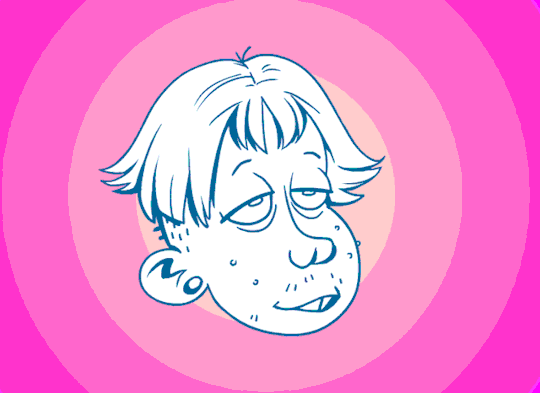
🦇Cheers, Barberwitch
*I check my privilege. I realize workings with those gender archetypes of sacred masculine and feminine may in fact be very peaceful and fulfilling for some. I’m all for that, but forcing it as an issue on others is where I draw the line. Saying someone needs to channel the divine feminine OR the divine masculine to connect to a specific thing on a meaningful level...is restrictive and exclusionary. Hence, why all my posts, spells, and workings I post are not only secular, but non gender based.
Last thing. I know gender is a hot button issue for a lot of people. It is for me too. The treatment of woman, non-binary, trans and gender fluid people is disgusting. People telling women what they can and can’t do with their bodies is shameful, but it goes further. Telling trans and non binary people what they are and aren’t because of what they do or don’t do to their bodies is just toxicity under another guise. So I don’t tell people who they are or what to do with their bodies. They’re social issues and I work socially against them. But my spiritual practice is mine and personal and it’s a non starter. It’s not some Freudian fantasy of every wand is a penis and every chalice is a wmbmb or whatever they say. It’s a fucking piece of wood channeling power through the plant and my energy. It’s a fucking cup that looks pretty that holds stuff and liquids for offerings. Don’t sexualize my practice.
#witchy asks#ask a witch#personal practice#gender in magic#gender witchcraft#witchy real talk#sacred feminine#sacred masculine#gender roles#witchblr#gay witches#gay witch#daulity#witch#witchcraft#male witch#witches#original post#tarot#lgbtq witch#queer witch#long post
104 notes
·
View notes
Text
Written Component: Tapu/Noa
Tapu and noa work as a mutual dependent duality, rather than as binary opposites. Tapu and noa are relational principles which are kept in balance yet can vary depending on context or events. Tapu is the strongest force in Māori life. It has many meanings. Tapu can be ‘sacred’, or defined as ‘spiritual restriction’, Typically principals such as touching someone's head, or food are common forms of noa, and when associated with tapu matter, it is considered offensive (Higgins). For example, associating Māori elements with certain goods, like alcohol, could be considered offensive as these things can devalue Māori culture. "A Rangatira avoided scratching his head with his hand because this would make the hand tapu. Until correct procedures had been followed to reverse the Tapu to the state of noa - the opposite of Tapu, it would be dangerous to use his hand for common activities." (Tapu - sacred Māori code)
There are times where you can possess more of one than the other. Tapu represents something forbidden or restricted, "Noa is the antithesis of tapu, describing the state of a place, resource or activity that is deemed ordinary or safe, and not subject to control" (Ataria). Tapu helps to control the randomness and thoughts you have with Noa. Stories throughout my childhood have given me the sense that Māori men exercised power over Women, from racially insensitive adverts and movies of Māori men beating their wives to even in primary school when you learn stories of Whakapapa. Predominantly male characters are the main focus and influential female roles are downplayed.
Colonisation has skewed peoples views on Tapu and Noa, this is in part to enable westerners understanding of it to be more comfortable. In doing this, women in Māori culture seem inferior to men and have had their mana stripped of them, with dominant western ideologies positioning Non-Māori as well as Māori men as being superior to Māori women (Pihama). Mana is something that comes from knowing who you are and the connection to where you come from. You can test someone's mana by the equal respect you get from them, such as standing above someone while talking takes that persons mana away, as it insinuates you are not equal. If you look at the Maiori language, it becomes apparent that inequality between sexes was not even a concept, as both personal and possessive personal pronouns are gender-neutral. Because women carry more Noa than men, they have been perceived to be only useful to cook and to carry children and not have any form of status.
Women and Men are essential parts in the collective whole of Tapu/Noa, both forming part of the Whakapapa that links Maori with the past present and future. Mikaere explains "The very survival of the whole was absolutely dependent upon everyone who made it up, and therefore each and every person within the group had his or her own intrinsic value." (Mikaere). In western society Males are perceived as the head of the household, when born you are property of your father, and once you are married you are property of your husband, 'woman and children were chattels to be used and abused by the paterfamilias as he chose.' (Mikaere). When comparing western and Māori ideologies of marriage it is evident that the way women are perceived in Maori culture has been whitewashed, but in fact once 'married' they retain their name and their primary source of support is with their whānau, not the husband.
'You could say that Kahukiwa's art is a form of biochemical warfare: in thrall to a hormonally-driven gynocentric world view, she relegates males to a secondary role. Women, it's stressed, articulate muscular energy every bit as impressively as males.' (Eggleton)

To Māori, women are te whare tangata – the house of humanity, Robyn Kahukiwa is regularly celebrating essential female elements in Māori culture. The series 'Upoko Tapu' is based on traditional Tikanaga, with the head being the most tapu part of your body. Huia feathers have been used to emphasise the Tapu because huia feathers are Taonga which are the treasures of ancestors and nostrils are flared to draw in Te Ha (the breath of life). The Woman in Kahukiwa’s painting possesses a lot of Mana. She makes a point of these women being important with the use of their Moko Kauae, For Māori women, as historian Michael King notes in his seminal book Moko, the moko was a rite of passage, marking the passage between girl and adulthood. Kahukiwa’s art has a strong feminist theme.
When the influx of English settlers arrived, Māori were pushed from their land and conformity began. Tohunga was then banned, and children were not allowed to speak Māori at school and by the 1970s the Moko had died out. Only a few elders wore Moko Kauae, and facial tattoos carried a negative connotation 'adopted by disaffected urban Māori, they became associated with gangs and crime.' (Duff).
For Maori Woman, it spoke of healing, reflection, empowerment and identity. Kahukiwa quickly shows all of these things through her artwork, 'she attempts to redress the conventional portrayal of women as less important than their male counterparts.' (Ministry for Culture and Heritage). In her paintings, Kahukiwa makes a secure connection between the Mana of birds/land with Wahine and helps Māori Woman as a form of holistic healing from the impact of colonisation, and helps to remove the stigma that Māori woman have been burdened with and encourage equality between Men and Woman - ‘kanohi ki te kanohi’ eye to eye as equals’ (Iti)
Reference List.
Higgins, Rawinia. “Te Mana o Te Wāhine – Māori Women.” Te Ara - the Encyclopedia of New Zealand, 5 May 2011, www.TeAra.govt.nz/en/te-mana-o-te-wahine-maori-women/print.
“Tapu - Sacred Māori Code.” TNZ Media, 7 Mar. 2016, media.newzealand.com/en/story-ideas/tapu-sacred-maori-code/.
Ataria, James. From Tapu to Noa – Maori Cultural Views On Human Biowaste Managment , stream.massey.ac.nz/pluginfile.php/3837535/mod_label/intro/Ataria, James (Ngāti Kahungunu and Ngāti Tūwharetoa), et al. %22From Tapu to Noa-Māori cultural views on biowastes management- a focus on biosolids.%22 Centre for Integrated Biowaste Research Report 16-01 (2016)..pdf?time=1594808802452.
Mikaere, Annie. “Maori Woman: Caught In the Contradictions of a Colonised Reality.” Maori Women: Caught in the Contradictions of a Colonised Reality - Annie Mikaere - Te Piringa: University of Waikato, 1994, www.waikato.ac.nz/law/research/waikato_law_review/pubs/volume_2_1994/7.
Simmonds, Naomi. “Mana Wahine: Decolonising Politics.” Women’s Studies Journal, vol. 25, no. 2, Dec. 2011, www.wsanz.org.nz/journal/docs/WSJNZ252Simmonds11-25.pdf.
Pihama, Leonie. “Tihei Mauri Ora: Honouring Our Voices. Mana Wahine as a Kaupapa Maori Theoretical Framework.” Tu Tama Wahine o Taranaki, 2001, www.tutamawahine.org.nz/tihea_mauri_ora.
'Hinetitama by Robyn Kahukiwa', URL: https://nzhistory.govt.nz/media/photo/hinetitama-robyn-kahukiwa, (Ministry for Culture and Heritage), updated 8-Mar-2019
King, Michael. Moko Māori Tattooing in the 20th Century. David Bateman Ltd, 2014.
Duff, Michelle. 'It's Transformative': Māori Women Talk About Their Sacred Chin Tattoos, 13 Sept. 2016, www.vice.com/en_us/article/9k95ey/its-transformative-maori-women-talk-about-their-sacred-chin-tattoos.
Catnip, Published by Content. “Mana Wahine: The Female Moko in Māori Culture.” Content Catnip, 11 Nov. 2018, contentcatnip.com/2018/07/15/mana-wahine-the-female-moko-in-maori-culture/.
Ocarrol, Hine. “Biography.” Hineocarroll, 11 Nov. 2015, hineocarroll.wordpress.com/biography/.
Eggleton, David. “Earth and Spirit Robyn Kahukiwa's Mauri Ora! Exhibition.” Art New Zealand, 2003, www.art-newzealand.com/Issue105/robyn.htm.
Pitts, Pricilla. “Book Review.” Art New Zealand, 1984, www.art-newzealand.com/Issues31to40/books3101.htm.
Iti, Tame. “Mana: The Power In Knowing Who You Are.” TED, 17 June. 2015, www.youtube.com/watch?v=qeK3SkxrZRI&feature=emb_title
0 notes
Text
Time Lord Culture, Language, and Gender
//So I got bored and this is what happened. Pronouns are a pretty big thing in my life. I’m non-binary and I use they/them or xe/xir pronouns. It’s been an uphill battle to get to a point where I’m comfortable with my appearance and even more of one to get people to use the correct pronouns for me. Even people who mean well. I’m an anthropology grad student. I’m in a department full of anthropologists - and when I’m not there, I’m with a whole bunch of ethnomusicologists, who are basically musical anthropologists. And the very first thing you learn in anthropology is to let go of the rigid boxes society has taught you everything must fit into. So these are pretty open-minded people. And it’s still a lot of reminding people and a lot of explaining what non-binary means and how singular they works.
So because I am both non-binary, fascinated by linguistics, and an utter nerd, I got to thinking. What must Gallifreyan pronouns be like? And I put this long, rambling thought under a cut so I don’t take up your entire dash.
So you know how the TARDIS translates everything? And, I mean, supposedly it doesn’t translate Gallifreyan, but hey, you kind of have to assume the Doctor does not actually speak every language ever and at least part of the time he’s probably speaking Gallifreyan. I cannot see it being otherwise. I mean, what good is the translation circuit if it doesn’t translate what the Time Lord piloting the TARDIS is saying? But I digress.
Anyway, I was thinking about this, because I am prone to doing things like that, and I wondered, you know, how do pronouns in Gallifreyan work? Hear me out on this, though. So in English, the language of the show, pronouns are relatively gendered. In English, in terms of pronouns that refer to people, you have he, she, and they. Now, all of those can actually be singular (and if you want to fight me on this point, you’ll also have to take that up with Merriam-Webster, so have fun with that) but we usually only use he or she if the subject is known. When talking about an unknown subject, we tend to use they, because we don’t know the subject’s gender. But there’s an (incorrect) assumption that if the subject is known, then we do know their gender and that they must be either a he or a she.
Not all languages are like this. Spanish, for instance, is actually more gendered than English. Pronouns for people in Spanish are el, la, las, and los. I did include plurals for a reason. El is he, la is she, las is plural she, los is plural he or just straight plural. There is no neutral option. Indefinite subjects like “the secretary” or “the engineer” tend to be gendered based on culturally defined gender roles. Additionally, there is no truly neutral pronoun like the English they. The catch-all plural is masculine and there is no neutral singular. But that’s not all that changes. Most nouns and adjectives have both masculine and feminine forms. So you end up changing a lot of things based on the subject’s gender.
I do know there exist languages in which gendered pronouns and word endings really aren’t a thing, but I can’t think of them off the top of my head. But I do have to wonder, would that not be what Gallifreyan is like? I mean, as Twelve helpfully points out, “We’re billions of years beyond your petty obsession with gender and its associated stereotypes.”
Time Lords (and I do have to wonder if the Lords and Ladies part of that isn’t also English rather than Gallifreyan) can regenerate as any sex. As such, their gender is a little bit more complex to suss out than a human’s - and we humans are pretty damn complicated. But basically, it seems to me that all Time Lords are, by human standards, non-binary. Now, there are ways that they can control their regenerations, so it is possible that they could choose to always be male or always be female, if that’s what felt more right to them. But it would seem that they just don’t adhere to the same ideas of gender as humans.
Language is a reflection of the culture it comes from. It’s sort of circular, actually. Language is a product of its culture, but the culture is heavily impacted by the language it uses. This is why people get so up in arms about terminology. Pronouns, for instance. The English-speaking non-binary community has made a big push for singular they to be more widely accepted as a personal pronoun because it grants us greater visibility and the way people speak is both indicative of and also shapes their world-view. So if you have a word for a person who is neither a man nor a woman, you’re more likely to accept that such people exist and are valid in their identities.
So Gallifreyan. Because gender as per human definitions doesn’t seem to be a thing among Time Lords (although not Gallifreyans as a whole if one wants to include groups like the Sisterhood of Karn), it stands to reason that the language would reflect that. Oddly, I can think of one instance right off that doesn’t support this. In the episode “Hell Bent,” the Doctor shoots a Gallifreyan general, forcing the general to regenerate. This prompts a response from one of their subordinates of, “Are you all right, sir? Oh, er, sorry, ma'am.” The general then remarks, “Oh, back to normal, am I?”
On the one hand, if the Gallifreyan language does not have different words based on gender, then there would be no reason for the subordinate to correct himself. On the other hand, the general doesn’t even seem to notice what sex they have ended up as, although they do go on to comment that the last regeneration was the only time they were ever in a man’s body. Additionally, Missy changes her name after regenerating into a female body and corrects a Dalek who calls her a Time Lord with the now widely known quip, “Time Lady, thank you. Some of us can afford the upgrade.”
All of that seems to contradict the Doctor’s assertion that Time Lords are billions of years beyond humans’ petty obsession with gender, as he puts it. And that’s before we even get into the Master’s snide comment about “Is the future going to be all girl?” I don’t feel like diving down that particular rabbit hole, though, so we’ll just stick to language. It does seem overwhelmingly clear that Time Lords are, to some extent, aware of gender roles. But this seems like it would be a distinctly human thing, and most Time Lords frankly haven’t had much contact with humanity. Probably the most well known human among Time Lords would be Leela, if I had to guess, because she wound up married to a Time Lord and lived on Gallifrey until her death. Most Time Lords just aren’t terribly concerned with humanity. The Doctor, the Master, Susan, and Romana seem to be the exceptions, not the norm.
So I think, honestly, that the amount of attention paid by Time Lords to gender is probably less to do with Gallifrey and more to do with the UK. Because the people behind the show are not Gallifreyan, they are British. They are not aliens from a distant and advanced civilization of long-lived shape-shifters, they are humans from 20th and 21st century Earth. They come from a country whose language, government, and society have all been historically very focused on gender. And that is very obvious in the show. If you start with “An Unearthly Child” and work your way forward from there, you can see the shifts in culturally ascribed gender roles. It’s a very long running series, and a lot has changed in 54 years.
Another reason this whole dissonance between language and function doesn’t make sense to me is that historically, at least in Western society, a lot of culturally ascribed gender roles had to do with the idea of women as mothers and men as providers. Women were supposed to be nurturing and emotional, while men were supposed to be strong and steadfast. And while we know at this point that this is bullshit, it has shaped a lot of our culture. However, that wouldn’t be the case on Gallifrey. Time Lords are sterile, or were at one point, due to a curse placed on them by the Sisterhood of Karn after the Sisterhood was driven out of Gallifrey. This is why the Great Houses and the looms exist. There is also a taboo on pregnancy. In fact, it’s illegal (or was at one time). I mentioned Leela earlier, and she’s pertinent here again, because the main reason this even comes up is that that restriction was eased for her and her husband because she was not a Time Lord, she was human. And even if that weren’t the case, the fact that they can change sexes from one regeneration to the next makes such rigid roles extremely impractical from a societal standpoint. There would be simply no good way to work that.
But Time Lord society does seem to be, at least for the most part, egalitarian. It appears to be an attempt at an egalitarian society as written by people who come from a society that is strongly patriarchal. There are a handful of truly egalitarian societies in the world, and it would be very interesting to see what Gallifreyan society would look like written by an author from one of those cultures. (Not that it’s likely that will ever happen, given they’re all very tiny and mostly very remote. Not to mention some of them have begun to be influenced by Westernization.) I would suppose you would get a very different view on what the language and culture would look like.
But back to the topic of language, because that was where I started with this whole thing. It really does make me wonder exactly how the Gallifreyan language works. I can only imagine that the use of gendered terminology for and by Time Lords has more to do with the English of the show and less to do with the Gallifreyan of their origins. It would really be an interesting thing to expand upon further.
#out of time#headcanon#about the time lords#gallifreyan language#gallifeyan culture#[[This got -way- longer than anticipated.....]]#[[Also I'm sort of drawing from all over the place here.#Part of this comes from the main show but part of it comes from the EU.]]
1 note
·
View note
Note
Wait... if gender's a social construct, then does that mean being trans is a choice? It sounds like you're saying that being trans is a performance. I can't see how one can be born trans without there being anything innate about the two genders.
“If gender is a social construct, being trans is a choice” makes about as much logical sense as saying “if money is a social construct, being poor is a choice”. Which, you know, money is a social construct. There is no inherent “value” to anything, regardless of when it was based on something tangible like gold or how it is today, based on…I don’t know, the trust of banks or something. I’m not an economist. Point is: monetary value is decided by us, so it’s a social construct, but just because it’s a social construct doesn’t mean it’s not real or doesn’t have real effects. It’s similar with gender: just because we define what it means as a society doesn’t mean it’s not real.
Also, being trans is not a performance. You’re confusing gender and gender presentation. The difference between the two is best exemplified in drag: people who are usually men (and usually even cis men) are presenting as women for the sake of a performance. Their gender remains male, only their gender presentation changes. I’m only saying this here because I’m probably going to use presentation later so I’d rather we be on the same page about what it is.
As for gender in particular, I have two three things to say. And just to be clear: I am a cis person, so I may make mistakes, although I think I have done enough research and listened to enough people to have a solid enough understanding to explain this, which is basically gender 101.
Also, have a cut because it’s a long post.
One: There are no “two genders”
The gender binary is also a social construct. There’s been plenty of explanations of that, and I don’t want to spend too long about this, because it’s not really the purpose of this blog (besides, biology is not my field of science). But the gist of the reasoning is this:
People who argue that there are only two genders tend to equate gender to sex.
Sex isn’t a binary itself, however. Sex is an ill-defined notion at best, too, but putting it on a binary is a bad idea whichever definition you go for, which tends to include:
Chromosomes. The good ol’ XX/XY is incomplete. Intersex people exist.
Gonads (sexual organs). Testicles and ovaries…but again, intersex people exist and some present organs that don’t fit neatly into one or the other, because both are grown from the same fetal tissue, so that tissue can go somewhere in-between.
Hormone levels, especially with testosterone, estrogen, and I think progesterone? Could be wrong about the latter. Regardless, this one doesn’t even work on anybody. There are cis perisex men with low testosterone/high estrogen, cis perisex women with the opposite, et cetera. Because hormones are complicated like that.
Ternary sexual characteristics (like pilosity, breasts, et cetera). That is actually the one we use to assume people’s sex and gender most often than not, since we can’t run a DNA sequencing, we can’t measure their hormone levels, and we can’t (usually) just ask to see their genitals. It’s also the most flawed of them. I mean, they’re controlled by hormones, so that’s a bad place to start for the reason I discussed above. Plus we can just work around them by altering gender presentation that I mentioned above. See also: binders, padding, make-up.
The sex binary was made by old scientists with incomplete data and a lot of confirmation bias. Any scientist worth their salt will tell you that if you have data that does not fit the current model, that model should be scrapped and replaced. I mean, without this (which is the very foundation of the scientific method), we wouldn’t have the theory of electromagnetism (which only all of the Internet relies on), or quantum mechanics, or relativistic physics. All of these replaced older models. Note that these old models, just like the sex binary, are still useful in specific situations! As long as you’re on Earth, Newtonian physics are fine and you can combine speeds additively instead of using the dreadful method of relativistic physics. As long as you’re talking about cis perisex people, the sex binary is useful to talk about a lot of their biological processes. But neither is useful outside of their hypotheses.
Back to gender. Gender is even more ill-defined than sex. I mean, without resorting to gender roles, it’s hard to even talk about what makes a man or a woman. So if it’s based on sex, and the sex binary, is outdated, why bother with a gender binary?
So…yeah. Gender today is understood to be on a multi-dimensional spectrum. As in, it’s not just “male, female, and stuff in between”. There are people who fall outside of the binary altogether, people with no gender, people wth multiple genders. Scientific observation tells us that, if this is their experience, our model that tells us there are only two genders is probably just plain wrong and we need a new one.
But back to that “it’s hard to define gender at all”. Put a pin on it. I’ll get back to it.
Two: The “born this way” narrative
That narrative. I understand how it came to be, and I understand its usefulness, but in the end, I loathe it.
See, the idea that you’re born this way (whether “this way” is referring to gender or sexuality) is mostly something to make the idea more palatable. And to make it less okay to, you know, oppress people based on it.
A lot of people relate to it. But ultimately, it is not a universal constant of the queer community, and if anything, it’s a little bit restrictive.
I mean, take sexuality. As a child, you may experience romantic attraction, but sexual attraction usually only occurs around or after puberty. So already it’s inaccurate to say that one is born gay/straight/bi/pan/poly/etc, because it’s something you only find out about yourself once you grow up and realize what those feelings are. And there may be external factors that delay that realization even further.
For instance, a lot of lesbians and queer women have reported that they only figured out their sexuality as adults, because before that, heteronormativity and misogyny made them assume that their lack of interest in boys was “normal”, that no girl really wanted sex or at the very least that they couldn’t like boys, because gender roles.
People who aren’t monosexual (whether because they’re attracted to multiple genders or somewhere on the asexual spectrum) similarly have a harder time realizing their sexuality because, usually, they’re not even taught that that exists. I was one of the lucky ones, knowing about bisexuality before I even had my own sexual awakening so I could place a name on it.
It’s the same thing with trans people. Some identify with their gender from as early as they’re able to, some take much longer, due to many reasons.
Plus, it speaks to a very weird societal mindset, to focus on being born a certain way as your “true” identity, as if people didn’t change and their identity was set in stone from the start. I think a much better narrative is that we’re born a genderless blob with no true identity of our own, and a combination of who we are and how our experiences influence us determines our identity, ergo our gender (as part of that identity). Then again, that’s just my philosophy of personal choice being at play here.
But really, the biggest issue I have with this idea is that it prevents people from questioning their gender and/or sexuality, when I think everyone, including cis and/or straight people, should do that. It is after all much more fulfilling to identify with anything because you’ve spent some time critically looking at the options and picking the one you like best rather than accepting what has been forced upon you.
Which leads us to…
Three: How do I know?
A.k.a. time to go back to that pin I told you to put on the idea that it’s hard to define gender.
While this isn’t a universally agreed-upon sentiment, I am of the school of thought that what defines one’s gender is what is referred to as gender euphoria. Now, I realize that “euphoria” might bring up the picture of some ecstatic feeling, but the term here is just used in opposition to dysphoria (the two being etymological opposites).
Gender dysphoria is one that people are usually more familiar with. It’s the idea that a person experiences discomfort with their assigned gender, and usually, with their body as per the expectations that gender places on your body. And “discomfort” is usually a euphemism, because it usually leads to disorders like depression or even to self-harm. It’s also what leads some trans people to need surgery or hormonal therapy, or just psychotherapy, as coping/healing mechanisms.
To some people, dysphoria is what defines transness, but as I said, I’m not of that school of thought, which goes back to my philosophy of choice. But also because it just seems odd to me to base a part of one’s identity around pain.
The theory around gender euphoria is that what defines one’s gender isn’t feeling bad about identifying with another gender, but feeling good about identifying with the “right” gender for you. Basically, if using the signifiers of one gender (such as, but not necessarily including all of, or limited to: pronouns, name, gender presentation and roles) feels better for you than whatever you’re using now, this is probably a better gender for you and you’re probably trans.
This theory doesn’t remove the possibility for dysphoria for the wrong gender, but it explains it as a side-effect of not experience gender euphoria rather than the defining experience of transness. And, well, seeing as “you’re only trans if you have dysphoria” is usually used by people to exclude other people from trans communities, and I’ve already stated my views on exclusionism in general…you can probably guess why I take this stance.
Now you’ll note that I only helped explain how you can tell what a specific person’s gender is here, not how to define gender in the first place. This is where we get back to the basic idea that gender is a social construct. All we can effectively observe is the signifiers of gender, and how people interact with those (dysphoria, euphoria, or just nothing at all). So how do we define a gender?
Well, that’s the social construct part—in other words, we can’t, not in a scientific way. Society (in other words, people) is what defines which pronouns or names are associated to what gender, or what we expect a person of a certain gender to be like.
Which is great! Because it means society is also open to more gender, or to redefine what those signifiers are. You’ve probably heard that the “pink is for girls, blue is for boys” idea is a fairly recent one and was in fact reversed less than a century ago, for instance. Or the fact that women couldn’t wear pants until fairly recently (in the scale of our society, anyway). That means we can introduce new signifiers for genders that are less represented (say, by making up new sets of pronouns), and we can also reject the signifiers that we feel are antiquated/oppressive (like…all of misogyny and toxic masculinity, basically). So we can have trans people while also not needing to cling to gender roles and sexism. It can be done!
I hope this admittedly long-winded explanation helps answer your question, anon.
#gender#transgender#sexism#feminism#gender theory#queer theory#identity#biology#scientific method#scientific model#st: other posts#Anonymous#ask
22 notes
·
View notes
Photo


⊰ Moira Singh ≬200≬ Light-Elf ≬Magic ⊱
⊰ Chimaera Bounty-Hunter ≬Non-
binary(She/they)≬Open⊱
Biography:
Once upon a time....
Moira’s story started before she was even born, beginning with two people from different Species, who met in the most ordinary of circumstances. Her mother had been a healer and her father traveled living off the land and working odd jobs when he needed money. The town they met in was small, which meant not many required her mother’s assistance and their only true interaction there had lasted just long enough for him to pay her for her assistance in ending a particularly nasty cold of his. It could have ended there, the two would-be lovers never meeting again and settling down with someone else. Perhaps then Moira would’ve been born as a pure blooded Elf. Perhaps she would have been half Bastet and half something else. She told herself that sometimes, as her parents recounted their story, but the ugly truth was that had they not been together she would not have been born at all.
Instead the two ran into each other again in another town, then in a city. Pure coincide, they assured the other and each time they were certain it would be their last meeting. Until finally the thought of never meeting again had become too harsh of a possibility to bear. It wasn’t love yet, but it could be one day and neither of them were willing to throw that away. What was once thought to be coincidence was proven to be fate - what other force in the universe was strong enough to push two people together if not destiny?
They married and traveled the world together, eagerly experiencing cultures and places for the first time, while being in love. Doing that changes how you view things, they’d tell Moira later. Makes you more inclined to see the beauty in everything.
The first time they stopped traveling for awhile was when they realized they were expecting their first child, but didn’t settle down until Moira was seven, their restless souls finally at ease.
Moira liked visiting her mother’s old home, always entranced by the way the stones seemed to ooze magic - magic that she would one day be able to use and cement herself as a Light Elf - and the way everyone seemed to be five feet taller than her. But it was the forest surrounding the Light Elf establishment that always ended up catching her attention more than anything else. She wasn’t supposed to explore it on her own. At ten years old she’d heard the spiel a million times, but if her parents were restless, then she was fitful. Adventures called out to her and she imagined the wind spreading tales of Moira the great Ogre slayer throughout the lands.
But she’d never be known as anything but Moira if she sat around waiting for the chance to be a hero to come to her.
The dresses her mother had started to put her in more regularly were destroyed as often as they are bought, much to her mother’s chagrin. She’d always favored her mother in looks, blessed with delicate features, but she had her father in her as well and despite her mother’s insistence that it was time to become a lady she could never resist laughing at the scowl Moira pulled - the one she learned from her father - at the idea.
She was eleven when she met a Dark Elf. Anselm looked so ordinary, so much like her and not at all like she had expected. At first she didn’t even know. The forest wasn’t devoid of people but it wasn’t often she ran into someone near her own age that wasn’t just traveling through and it was even more rare that they seemingly shared the same desire to go on grand adventures. When she picked up a stick and held it as a sword her new friend followed suit.
Anselm became her escape from the world she continued to grow disconnected from. Her parents thought that boy was from a near village, which was mostly due to her omitting the fact that he was a Dark Elf. The two grew older, his temper growing with them, but they never lost their sense of adventure. It was a few years later that he started to spit out hateful words for the others they ran into in the forest occasionally. Moira always nodded at this but did not respond for she did not share the same views and didn’t wish to push him away either. He took her silence as assent.
She knew that he was a Dark Elf, and had been warned about their aggressive ways, but he had seemed so reasonable. Even when he spoke badly about other Species he seemed to make sense - even if she didn’t agree. But eventually that wasn’t enough for Anselm. He was angry and he wanted her to be too. And as she accompanied her parents to a Light Elf gathering, flowers weaved through her hair, face painted, she was. It made her feel constrained in a way that she had never felt before. He tried to twist that anger into hatred but it didn’t work, she was neither hateful nor was she a sheep.
One day his anger got the better of him and he injured a a passing Kitsune. He didn’t mean to, she could see it on his face immediately, and it served as a wake-up call for the both of them. For all his raging at the world, he didn’t want to hurt anyone and for all the affection she held for him, she couldn’t continue to watch idly as he became someone she didn’t recognize.
Her first act of magic was healing.
The only payment required from the Kitsune is that he continued on his way and did not seek revenge. It was her parting gift to Anselm. They went ways, stoic faced but not unkindly. For years it felt like she had abandoned him in his anger, but the older she got the more she understood that she hadn’t been in a position to quench these flames inside of him.
Moira continued her life without him, finding other things to fill her time with, now that she no longer spent all of it in the wilds with her friend.
She eventually left her parents and got a job. Didn’t hold it down for long. She was a hard worker but she couldn’t thrive in a setting where she went to work and came home to the same place day after day, nothing ever changing. Instead she started traveling. It was then that she saw Anselm again but they didn’t speak. And as if she was cursed with his memory she ran into him again and again.
She didn’t choose to be a bounty hunter so much as she fell into it. The wanted poster caught her attention and she was strapped for money. It wasn’t Ogre slaying but it was something. Finding the Chimaera wasn’t hard, it was only the matter of getting him to come to her. She wore a dress her mother wouldn’t approve of, hair pinned up so her neck was in full view, lips painted red as blood - war paint - she scoffed at a man who had trouble oggling her with any subtlety.
Don’t underestimate me, she had warned her target in a breathy whisper, half of her face hidden behind her cup and the other half obscured by shadow. He laughed at that, assumed she was being cute. Well, she did warn him didn’t she? He fell into her trap like a fly in honey, found himself in shackles before he could even begin to process the mistake he had made. The same mistake everyone seemed to make back in her first days of bounty hunting before she had made a name for herself.
This drew the attention of another more seasoned hunter, someone who was looking for an apprentice and partner. Magdalena came to be a mentor, and a close fiend after that. She seemed to share Moira’s views on their profession - that there were no shades of grey. The people they caught were bad people. Why else would they be on wanted posters that listed crime after crime? Moira didn’t ask what happened to her targets after they were handed over the authorities, she didn’t want to know and as far as she was concerned it was none of her business.
She didn’t care that some thought her too tough or too manipulative, that others thought her too soft based on appearance alone. She held herself to no restrictions; not as an Elf nor as a Bastet and certainly not as a woman. She did what she wanted, became the person she wanted to be and not the lady the world thought she should be.
They thought her sweet and she’d show them - just like sugar she’d rot their teeth.
She missed the forests. New Naraya didn’t lack in woods but they weren’t the same, not even close. The trees didn’t whisper anymore and that is possibly what she mourned more than anything else about her old home. She had her distractions of course, her job taking priority above all else, but at the end of the day when she retired to her house there was nothing to distract her from all that she yearned for from Naraya. Her former mentor, Magdalena, had again taken the elf under her wing; the list of of wanted Chimaera never seemed to shorten and Moira was appreciative of the help.
But with every caught Chimaera, Mags seemed to become less disenchanted with their work. It wasn’t uncommon for her to often catch the older woman lost in thought or for her mood to randomly fade into a bout of uncharacteristic anger. The worst yet? She was sure she caught Mags interacting with one of their targets more than once, but the woman always brushed Moira’s questions off, claiming that she was simply seeing things that weren’t there.

Connections:
❖Anselm: Childhood friends, Anselm was the first person barring her parents, to entertain the idea that she could be anything she wanted. There was a deep trust between the two but ultimately their differences drew them apart. Despite many years having gone by since their last meeting and feigning to be on good terms when they parted, the best word to describe these two’s thoughts about one another is pained.
❖ Magdalena: Once, Mags was everything Moira aspired to be. A part of her still does. The woman trained Moira free of charge and it’s through her that Moira found the wanted poster that set her on her path as a bounty hunter. Their past serves them well now, their partnership enabling them to work together almost effortlessly but Mags is keeping things from Moira and what sort of partnership is there without trust?
❖ Connection 3

Possible Plot Ideas:
❖ Some would say that what Moira is doing is wrong while others say that there needs to be more people in Moira’s occupation. Chimaera can be - and many are - dangerous creatures, but there are some out there who are just people born in unfortunate circumstances. Her possible shifting in alliance, or complete devotion to her job will be something to explore.
❖ Falling out of touch with Anselm may or may not have been for the best, but there’s no doubt that there was a strong bond between the two despite their Species not being fond of the other. Fate brought Moira’s parents together several times but Moira insists her meeting Anselm is purely coincidental. Eventually she will run into him again in New Naraya, is a rekindling of a friendship in order or are the two’s opposing views just too different to ignore?
❖ Moira has always been an upfront kind of person and knowing that Mags is hiding things doesn’t sit well with her. Frustratingly the woman chooses instead to lie to Moira, and so the only way to find out exactly what’s going on is to spy on her. It’s a tactic she doesn’t like using on someone she holds as a close friend, but she can’t help but think that Mags is involved in something that would have dire consequences for the both of them.
Gifhunts for Priyanka Chopra: X X X
Note: Moira is a Demi-girl and therefore their player can choose the pronouns they use.
2 notes
·
View notes
Text
Panama in the pandemic
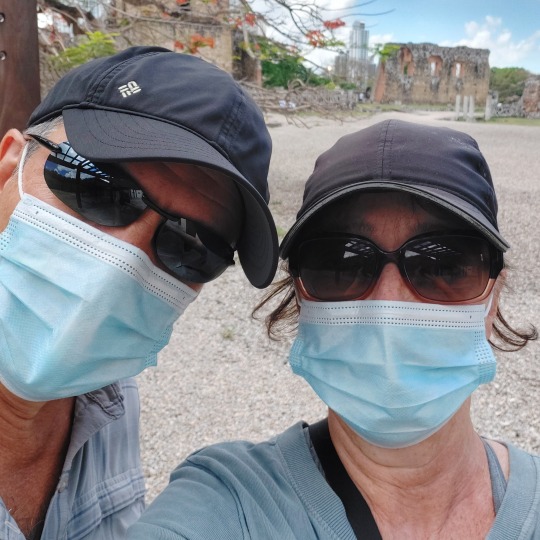
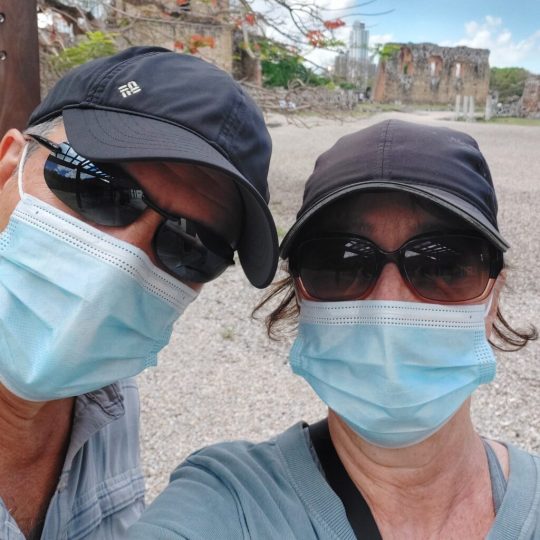
It's weird that we have spent most of our time in Panama in a pandemic. But, we've been extremely lucky to be safe, healthy and employed.
The vaccine is slower to roll out here than in the U.S. but while we wait (me more impatiently then Jeff) I'm reflecting at how much different things are now vs. a year ago.
Panama had one of the strictest quarantines in the world. The below chart (taken from a site called Our World in Data https://ourworldindata.org/) shows the level of restrictions compared to the US.

For a week there in November we were living life free and easy compared to the US.
At first it seemed like no big deal
It started out the same here as everywhere. We thought it would be over in two weeks.
Here we are learning the pool was closed (or auditioning for most overly dramatic expats ever). Imagine our faces if we had known it would be a bit longer than two weeks.
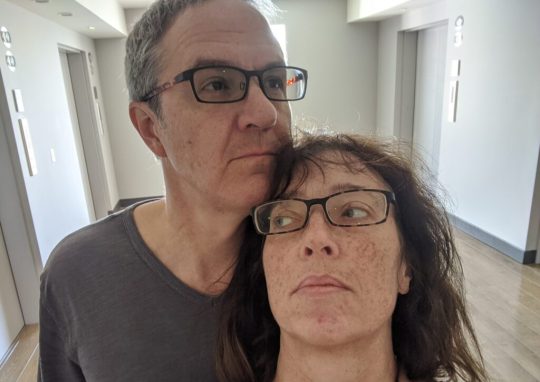
Alas, the pool has closed. We are tortured.
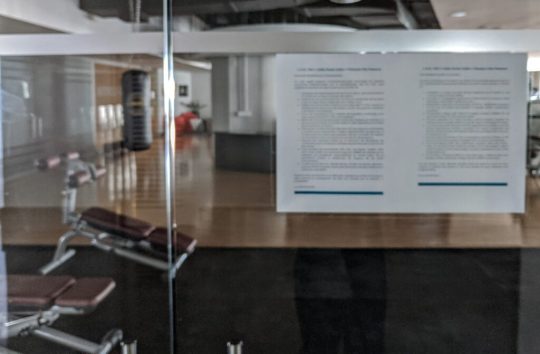
Not sure why I cared about the gym closing since I never used it.
When they started boarding up the stores we got a little nervous. Would there be looting? Riots? Toilet paper shortage?

There weren't any riots, looting, or even toilet paper shortages.
And then came Women and Men days
When they divided the week up into women and men days we became concerned. When we found out you could only go out for two assigned hours on your day we freaked out.
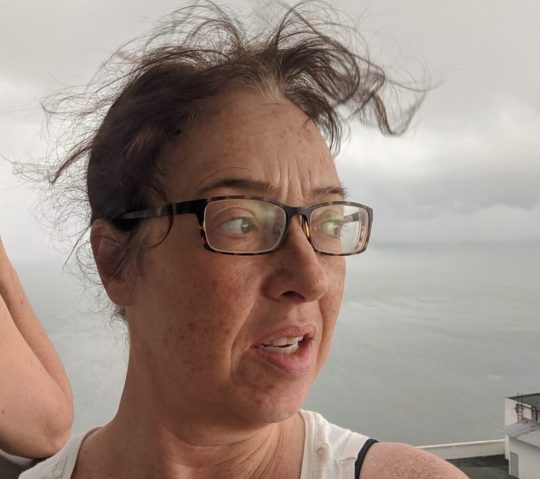
Wait what?
Based on the last digit of my passport and being female, I had 8:30-10:30 M,W,F. Jeff had 7:30-9:30 Tue and Thur only. For once, being a woman came with some advantages. Men having less hours than women is probably whey they expected rioting.
What happened if you were transgender or non binary? Sadly, you might be harassed or arrested.
What happened if you were out at the wrong time or day? You could be fined or even arrested.
How did they know if you were out at the wrong time? There were police checking your documents to make sure it was the correct time. If you went to a grocery store at the wrong time they would not let you inside.
But if living in another country teaches you anything, it’s to be adaptable. We started having our food delivered online.
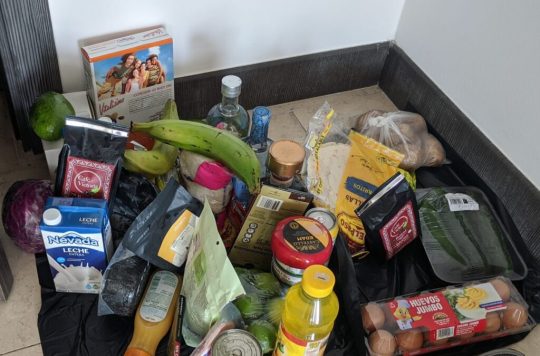
Remember when we washed all our food before it entered the house? Still never quite figured out how to wash a pineapple.
Since we were only allowed to go grocery shopping during our two hours on our day/times out I walked to the grocery store, the far away grocery store.

Remember when we thought this was a good idea? Maybe I can just wash this elevator while I'm in it since I'm already wearing rubber gloves.

Hello ladies mind if I get in line with you?
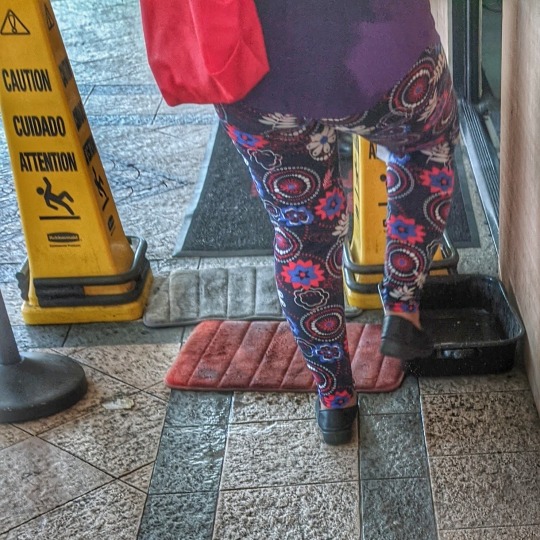
Going into a store required a mask, temp check and a foot bath. Note these are not my feet or legs but I do wish I owned these leggings.
We thought we'd get fit during the pandemic
In our spare time, which was all the hours, we climbed up and down the fire escape.

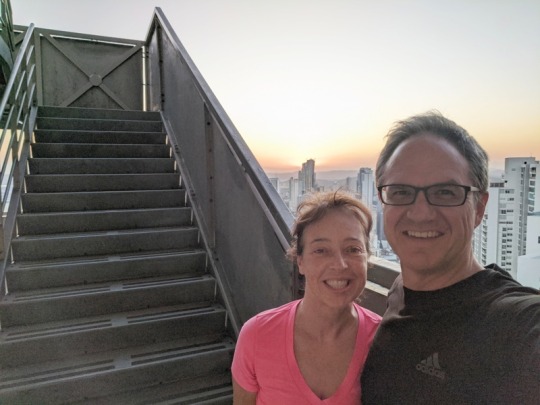
Then an email went out to the entire building saying no one was allowed out on the fire escape unless it was a declared emergency.
No problem, we had long hallways. a parking garage and balcony .

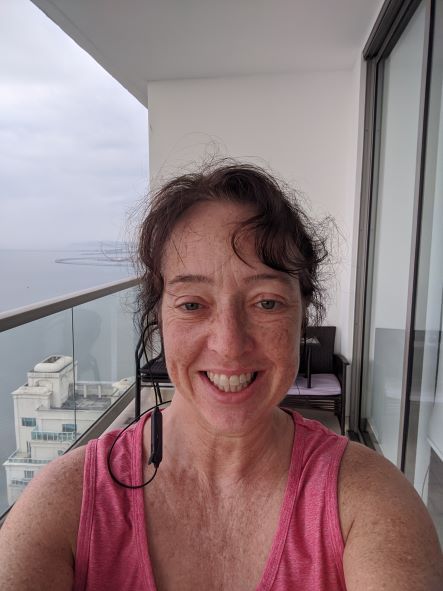
Who wouldn't want to workout in a parking garage in 90 degree heat? And it was only 38 times back and forth on the balcony to equal a mile.
I even bought a Door Gym.
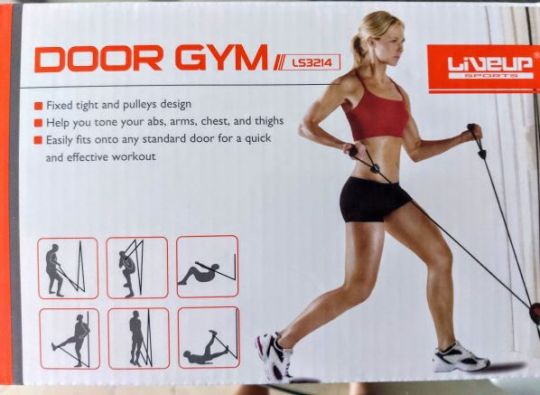
This worked great we used it every day and got super fit. hahahaha. Not. I tried it once, was afraid I'd break the door and poke an eye out.
We only went a little nutty
Soon we found that exercise was overrated. There is some research that shows that exercise helps to alliviate stress, but we seemed to be just fine.
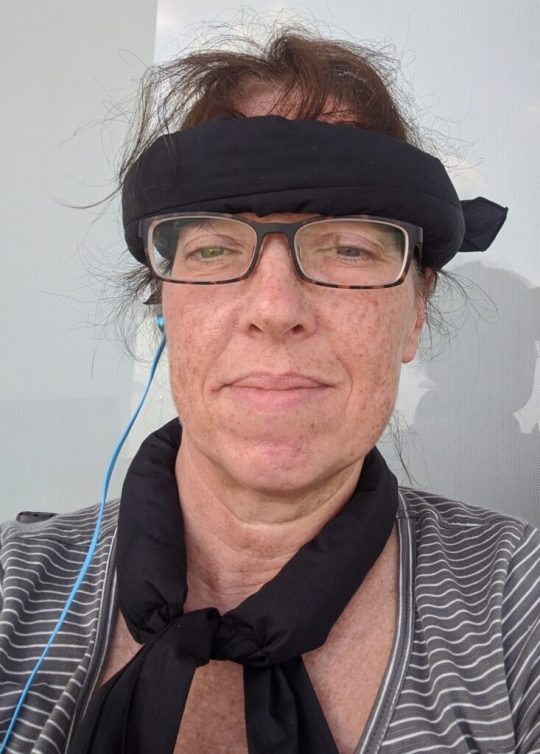
What do you mean I shouldn't turn my video on during a work zoom call?.
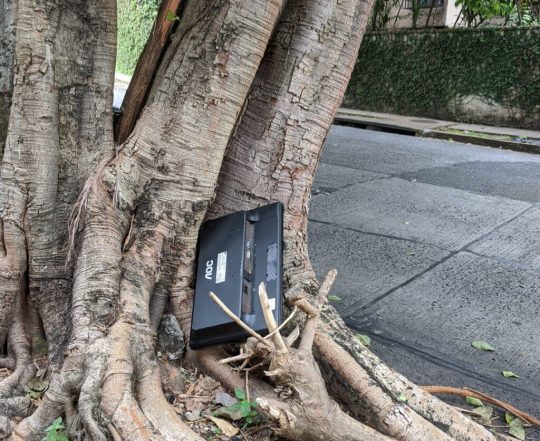
I did not throw this monitor at this tree, only because I didn't have a computer monitor.
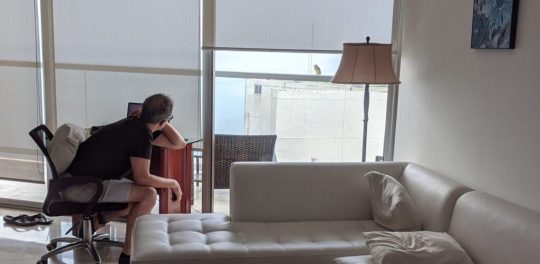
Do you think that bird on the balcony will be my friend?

This bug will be my new pet. I shall name him Clyde and cherish him forever.
Buying these highlighters were probaby the highlight of the pandemic for me (excuse the pun). I spent an entire day doing a photo shoot with them.

They're so pretty.
Alcohol was completely banned
Worst than not beling allowed out of our apartment building? Alcohol sales were banned throughout the country. Yes, banned! Why? We think they wanted people to spend money on food not booze, and it would help keep people from getting drunk and breaking the quarantine laws.

Shoplifting never seemed so appealing.
After our wine and gin was depleted we had to go into stealth mode. The local mini mart still had a healthy stock of liquor. Sure they had signs saying they couldn’t sell it. But Jeff is nice and good at Spanish. He talked them into selling us a secret bottle or two.
In theory you were not even allowed to drink alcohol in your own home.
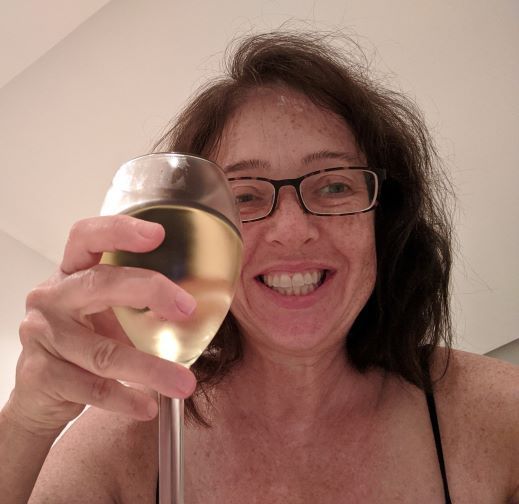
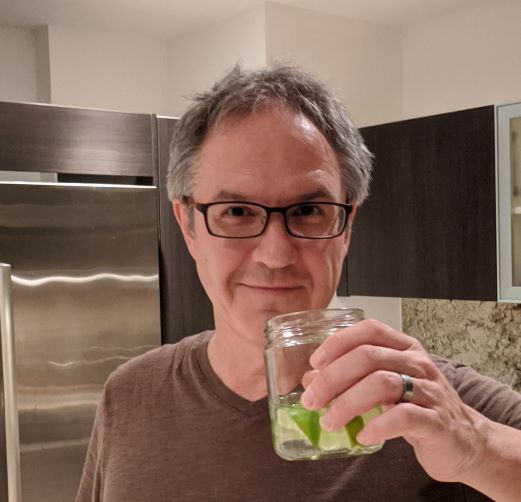
That was one law we had to break.
We had friends to break the alcohol law with
Lucky for us, the only friends we have in the entire country, happen to live in our building. We could hang out with them without breaking quarantine.
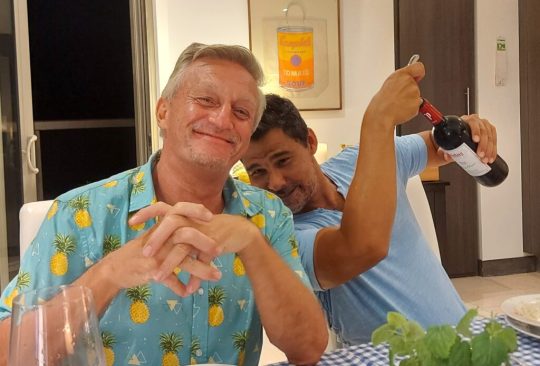
Rolf and Samuel were friends before the pandemic, but in the last year they have become like family. We have spend countless evenings, holidays, and many bottles of illegally purchased alcohol together.
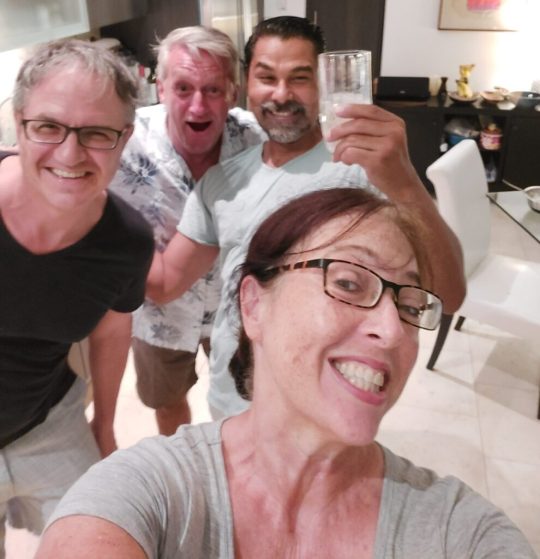
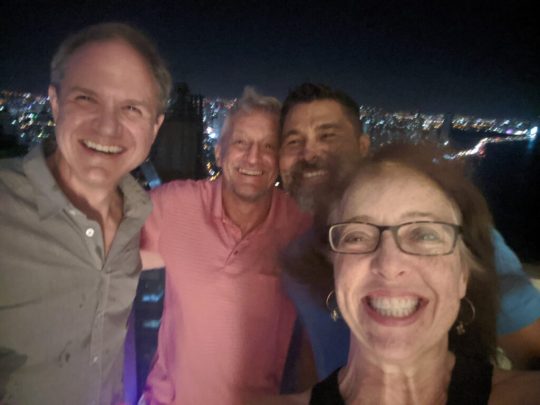
Can you see all my teeth or should I smile more?
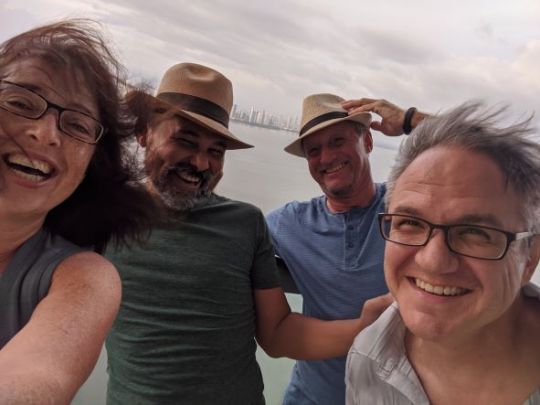
Their balcony is way windier than ours.
Not only are they great people they are fantastic cooks and hosts.
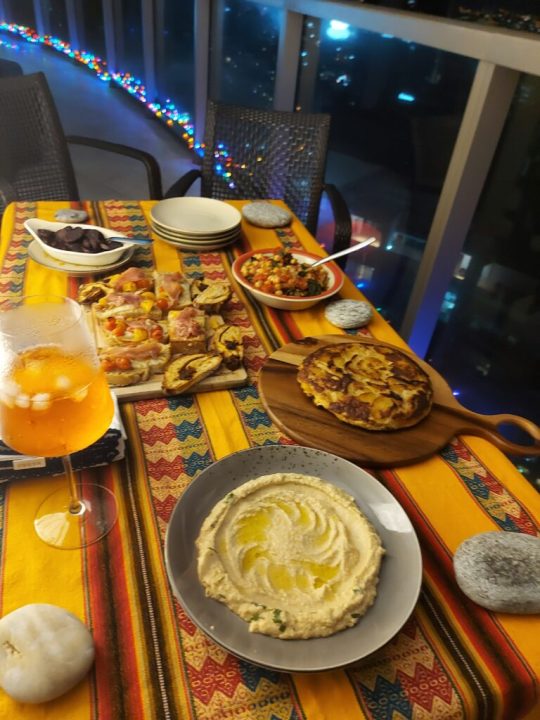
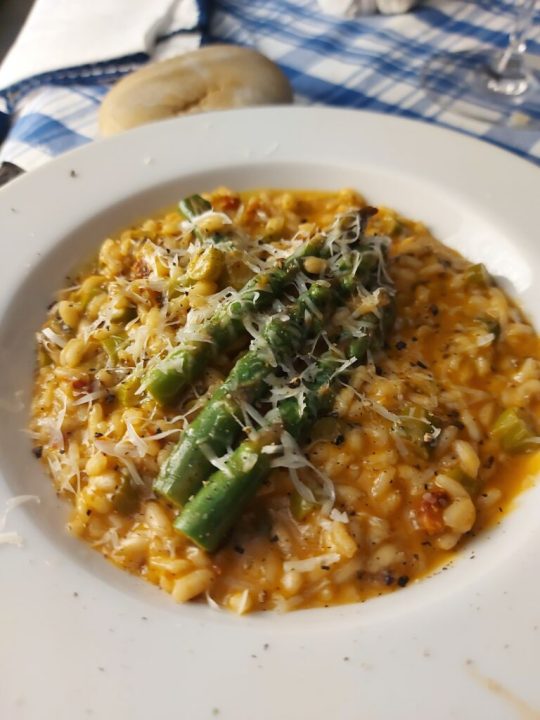
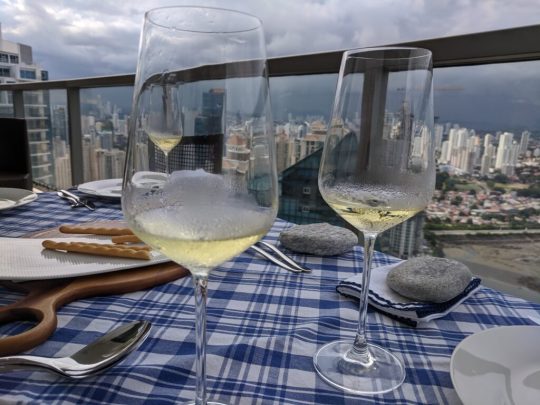
Dinner at their apartment includes champagne, beautiful table settings and professionally plated food.
Dinner at our apartment is a more informal affair.
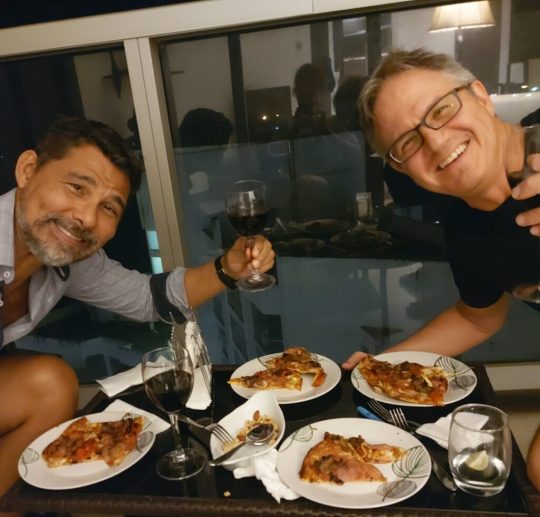
Oh wait you need a fork? Yeah we don't have any clean ones.
As things got better, parks opened up. I was able to walk out here on women's day. I was also lucky that my assigned time was early in the morning before work started and before it got too hot outside.

Finally, after months of only being outside seperately, they lifted men and women days and we could venture out together.
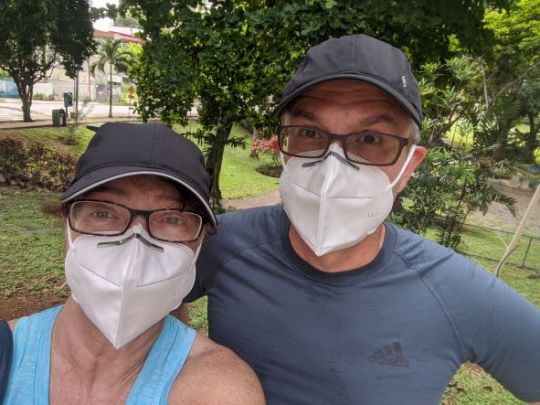
Shery: Why are you standing so close to me? Jeff: Really? Another selfie?
So yes, we came to Panama and then were in lockdown for a year. But, we've stayed healthy and employed, been able to Zoom with our family and friends, and have friends here.

You would think I wouldn't complain now that the pool is open again and I can just sit here while I wait for the vaccine. But I do complain...a lot.
Restrictions have lifted but the vaccine is slow to rollout . Currently to be eligible you have to be sixty and above.
What's next
We are venturing out slowly and safely. And to answer the question of what's next? We really don't know. Our #1 priority is to get vaccinated and see our families. After that we hope to return to Panama and do the trip we planned pre-pandemic. So we'll see. In the meantime we continue to wait for the vaccine here in Panama City
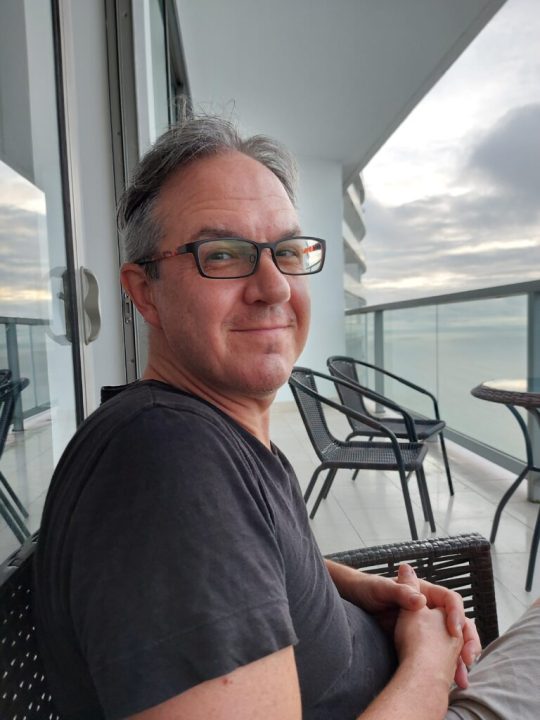
.
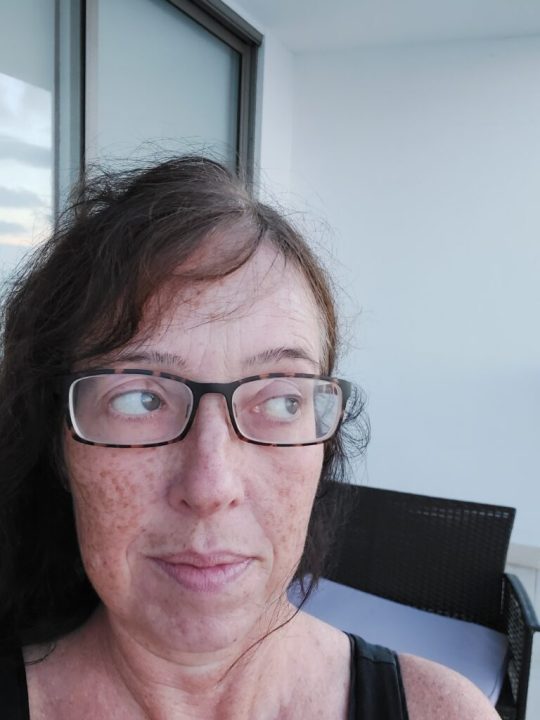
Jeff: Look at this view. Enjoy it and be patient.
Sheryl: Hurry up with the damn vaccine already!!!!!!!
Read the full article
1 note
·
View note
Text
An essay on marriage, gender, and my feelings on the subject
Fuck my thoughts on marriage/relationships swing from like wanting absolutely nothing to do with it to longing for it and back in like 5 seconds flat
Like, sometimes there’s just this gentle idea of two people just,, being there,, together. Being there for each other. Someone you know you can count on, to spend time with for the rest of your life. And yeah you can have that without marriage, and yeah friendships are important and valid too but having one person there for you for all the ups and downs, enjoying life’s simple pleasures together seems nice.
But then I’ll think about like having one person around you all the time seems exhausting, like needing to tell someone where you’re going before you go somewhere (or at least when you decide to go somewhere) because they’ll be worried about you seems so stifling if I want to freaking take off down the road for a sudden road trip I can’t just do that if I have a partner like that, or a relationship, a marriage. I couldn’t hop on a plane on a whim with just my purse, a jacket, and my passport if I were in a stable relationship. I’d have to coordinate with someone, telling them my plans in advance, have to accommodate their stuff in my life. I couldn’t just decide to get up and go on a walk at 3am without telling the partner, bc it’d be inconsiderate of the other person in my life that I had made a commitment to.
And then I think about like the trope of a contractual marriage, or a marriage out of practicality instead of love and that kinda interests me in that it’d be based on a different kind of relationship from the start,, like you do your think ill do my thing and when we’re together we’re together. I feel like a relationship that is less restricting than the traditional one thought of when you think of marriage might be ok, like because this is for reasons other than pure love and affection for each other there wouldn’t be as much obligation to do the things that I feel would make me feel stifled or controlled or restricted. But would that kind of relationship be worth it to me in the first place? Would there be any emotional support or emotional reasoning at all for that kind of relationship? Bc like I said, the thing that kinda makes me want a relationship or marriage is the allure of having a constant, having that shared domestic bliss stuff I already talked about.
And then there’s the societal thing to consider, like do I really want a marriage or a relationship or am I just brainwashed by the heteronormative, monogamous nature of our society, so I really want romantic love or do I just like the idea of it? And if I did decide I wanna do marriage, I know that if I marry a guy, I’m just reinforcing the heteronormative patriarchal narrative, like I’d wanna be on equal footing with whoever my partner may be, but are there truly any guys out there who really don’t consider women to be less than men? Are there men that exist that have not been, even down to the subconsious level, affected by the patriarchal views and norms of society? Would there be a guy that would view me as a true equal, rather than someone inferior? Even if there’s a guy unaffected though, society as a whole would never see us as true equals, like even if I’m assertive and confident, he would always be viewed as the man of the household, the leader in the relationship to society at large. Like, even in media, fiction, etc the relationships between a man and a woman always have a balance of power that favors the dude. Like, even if the woman appears to be on equal footing, the way the actions are framed, the dialog, the narrative, it always ends up favoring the dude. The dude always has control. Like she might be able to turn his head but when it comes down to it, she is the one that capitulates, that is subservient, that acquiesces to him. And that is squicky for me. The whole concept of marriage is a bit squicky for me because of the power dynamics intrinsically tied to marriage, especially between a man and a woman. (side note, I think this is a big part of why I read gay shit more than straight shit)
The way to somewhat avoid this would be to go the other way, get into a relationship with a lady or non-binary or genderfluid person, but am I really confident that I’d be able to face my family with a partner that isn’t a straight man? Like, in my life there are so many things I do to keep the peace in my family, to not rock the boat, to not be weird, to not be an outcast. There are so many choices I make that I make in the vein of going along to get along. I hold my tongue, I make a different choice, I say something else, all because it is so much easier to do so. In my immediate family, there is no one who has come forth, or has even slightly hinted at, being LGBTQ+. Even in my extended family, there’s only 1 other person I know of that is confirmed to be not straight, and she isn’t out either, for probably similar reasons. Like, I can pass as straight for now, but could I ever become brave enough or willful enough to make a choice that isn’t the path of least resistance?
There’s always the option of just living with people, being a family without marriage. I almost feel like marriage is the thing itself that establishes that inequality, like once you say I do with a guy, that’s it, you are never again seen as a truly independent, equal human being. So avoid it, just cohabitate with people. If you never make it official then you never make yourself permanently less than, you still can maintain that slippery slope of being seen as an equal human being. Because if you aren’t tying the not, then they never truly hold that power over you. But still when I think of the idea of having someone to report back to, to consistently communicate with, to accommodate, I get this stifled repressed feeling, like I’d almost rather die alone than have to be tethered to someone like that.
And sometimes the idea of being alone, independent, no kids, no partner, just me, my life, my desires, my freedom, my travels sounds amazing. I’d be free for the rest of my life, only choosing to return to my family when I want to return to my family, only choosing to be around people I truly want to be around. And it’s not like there aren’t other important relationships in my life. Like, a good half of my relatives I do enjoy being around, and I have friends that are important to me. I’m already an aunt (I have some pretty awesome niblings) and I could probably be an adoptive godmother to someone for the children thing. I’m not even really sure I want kids, like that’s a lot to handle. Plus I wouldn't wanna fuck them up with my own fucked up stuff, or subject them to the half of my relatives that I’m not such a huge fan of. But if I did need kids I could adopt. Or hell, just get the kid and skip the sex via a sperm donor. Or foster kids. Or just fucking babysit other people’s kids for a couple of days, that might cure that desire. Or get an animal. Animals are great too.
But then I think of domestic bliss?, but then I think of being stifled, then I think but marriage/relationships?, then I think but w/guys the perma inequality, but what about a not straight relationship? then i think but the fear and panic and unease of doing not straight bc my family
And then sometimes, I just wish I had been born as a guy, never having to worry if I’d be seen as an equal to my partner. Sometimes I feel like it’d be easy to just chop of the boobs and move on with my life. Maybe then I would feel less stressed about it all. Or maybe I should make like the historic not-straights and just live with “a good friend” for the rest of my days. Or maybe just die alone after a long, fulfilling life of just doing my own thing.
0 notes
Video
youtube
*Tumblr #3*
In this entry, I will be examining the critical question: What gender/sexuality norm is constructed or undone in this artifact, how is it rhetorically done, and/or how does it promote a dominate ideology over a marginalized group or push back against the ideology or gender norms? Is it productive/unproductive (ethical/unethical)?
To further examine these questions, I searched for examples of gender/sexuality norms across various film genres. In finding obvious examples in popular movies (Anchorman, Grease, etc.), I realized such depictions were relatively unhelpful, as they resided in somewhat fictional situations. I ended my search when I discovered the video, “Touching Halloween PSA Brings Awareness to Gender Stereotypes in Children” or originally titled, “My Heroes” (Plus). In this public service announcement, the dominant norm of dressing in gender specific apparel is challenged by the video’s imagery, tone, and effective play on ethos to propel an alternative frame/angle to view gender norms in children and the rest of society.
The title of the PSA, “My Heroes,” is described by its publisher as a video that “challenges gender stereotypes with Halloween costume choices” and introduces an alternative angle to viewing dominant gender norms in society (Plus). The commercial starts as many other family commercial airings for the holiday of Halloween do: kids are running around excited for the a famous night of collecting candy and dressing up in costumes that display a favorite character, monster, or that of their family’s choice. There is one boy and one girl in the star family, and each excitedly grabs their costume and gets dressed for the big night. From my own viewing experience, the first minute and a half seems like an average Halloween commercial that would finish with the advertisement of some product or service. It isn’t until the end that you understand the rhetorical message behind the video.
Butler (2008) explains the concept of undoing “normative conceptions of sexual and gendered life” that we are surrounded by in every facet of life (1). Butler states, “Sometimes a normative conception of gender can undo one’s personhood, undermining the capacity to persevere a livable life. Other times, the experience of a normative restriction becoming undone can undo a prior conception of who one is only to inaugurate a relatively newer one that has greater livability at its aim” (1). In other words, dominant norms in society have consistently clouded and barriered out marginalized ideologies in favor of gender stereotypes. As a result, people who challenge these established gender norms have been living hindered lives that have been subsequently restored by the undoing or alternative view of gender. Butler also believes that both our dominant societal beliefs of gender have changed and that they also have no reflection of an individual’s expression or identity. She states, “What does gender want? To speak in this way may seem strange, but it becomes less so when we realize that the social norms that constitute our existence carry desires that do not originate with our individual personhood” (2). Butler then expands on this idea by asserting these norms hurt our ability to thrive as a person, stating, “the viability of our individual personhood is fundamentally dependent on these social norms” (2). As we have seen in United States history, people have always been seen as less than human in the eyes of dominant ideologies. Butler states, “The human is understood differently depending on its race, the legibility of that race, its morphology, the recognizability of that morphology, its sex, the perceptual viability of that sex, its ethnicity, the categorical understanding of that ethnicity. Certain humans are recognized as less than human, and that form of qualified recognition does not lead to a viable life” (2). In short, from a young age, individuals experience a certain degree of criticism based upon their behavior, mannerisms, and beliefs that directs them to follow the dominant gender and societal norms set by the societal majority.
After watching this PSA, the most evident gender norm being challenged is related to the clothes and costumes designated to a specific gender (boys and girls). Specifically, the costumes in the commercial, “My Heroes,” are Wonder Woman and Batman, which are traditionally known as costumes designed for a girl and a boy, respectively. By having the boy and girl dress up in the costumes they feel the most comfortable in, which is contrary to what society deems normal, the commercial positively promotes an alternative approach to parenting and weakens the norm that children must wear gender specific clothing. Although there is little dialogue to depict what is actually occurring in the commercial, the combined use of uplifting music, imagery highlighting the joy the kids feel by dressing up as their favorite hero, and the mother and father being supportive, loving, and understanding, going so far as to even state “My Heroes” at the end, ultimately demonstrates that, as Butler put it, “… a certain gender does not imply that one will desire a certain way”(Plus) (Butler 1). In admiring the kids’ excitement, you can see they were okay with dressing up in costumes that reflected heroes of the opposite sex. They didn’t care whether it was designed specifically for a boy or a girl. The kids only wanted to be happy, and they made their own decision based on what made them comfortable, irrespective of the gender norms of their parents.
Halfway through the video, the father looks concerned after his two kids chose their respective costumes. Was he worried they were choosing the wrong costumes? No. Did he choose for them? No. In the end, he respected their decisions and, as long as it made both his kids happy, both the parents were going to be happy too. I believe this video effectively captures the parents’ feelings of empathy and uncertainty in a manner that makes you feel like you would want to make the same respectful decisions the parents made. In line with what Butler states, that, “…life is constrained in order to open the possibility of different modes of living; in other words, not to celebrate difference as such but to establish more inclusive conditions for sheltering and maintaining life that resists the models of assimilation” (4), this commercial is aimed to spark a conversation about making space for new gender stereotypes in the context of Halloween costumes, showcasing not only that it is okay to act or dress differently than societal gender norms, but also highlighting how we are all different, thus necessitating an inclusive environment in order for everyone, young and old, to live an enjoyable life.
This commercial also allows me to analyze the other facet of my critical question regarding why a certain PSA/commercial is a productive step towards creating a more inclusive society that doesn’t rely on gender specific norms or stereotypes. To reiterate, our society has created “norms” for the majority to conform to, and these same ideas have negatively affected individuals’ lives when they don’t match their own ideas or “norms.” As Butler puts it, “If I have any agency, it is opened up by the fact that I am constituted by a social world I never chose” (3). No one is born a certain way; thus, it is impossible to be completely aligned with all the popular societal views. Given that everyone is unique, there cannot be one societal or gender norm that accommodates all of society. This PSA does a productive job of championing untraditional families in which masculinity and femininity have transformed from a binary into a spectrum in spite of societal pressure. In short, we should view this commercial as a measure of progress regarding what it takes to abolish gender stereotypes and norms in children, as well as the rest of us.
Kassay (2018) explains that while gender norms and narratives strongly rooted in stereotypes are created in children’s lives from an early age, new gender tendencies among children from Romania are emerging. Though the norms and social stereotypes are specific to a particular country’s beliefs and people, her study reflects the context of the commercial, as it was conducted with children and the gender stereotypes associated with their favorite heroes. Kassay stated, “The Romanian context is more patriarchal compared to the European and American standard; however, the global trends can be observed as more pronounced in the cities” (15). Kassay conducted 80 interviews and analyzed the findings to discover whether gender played a difference in children’s preferences of heroes. Kassay stated, “The findings of the suggest that gendered heroes have a greater impact than genderless characters; however, several factors influence the process of children’s identifying with their favorite characters, such as social background, parents’ education, and the effect of the larger community” (1). In other words, the social norms and outside factors surrounding the children’s consumption of media and entertainment is heavily influenced by what society already believes is “right” or the dominant majority. Kassay also found that marketing to children is very gendered, which has an impact on their playing and consumption, while their social context and peer group have an increasingly larger influence on their attitude towards gender roles and stereotypes (15). Given that these findings are valid, the commercial/PSA that I chose may elicit a positive impact on marginalized children and groups that feel uncomfortable in their own skin regarding the established gender norms in the United States. Kassay stated, “The global trends show there are signs of change in the strong gendering of products, and gender consciousness is becoming more and more prevalent” (15). Applying this trend to the Halloween commercial, I believe that the more messages showcase the abolishing of traditional and openness to alternative gender stereotypes, the more people will begin to shift away from the shackles of the majority.
In summary, “My Heroes,” or the video titled “Touching Halloween PSA Brings Awareness to Gender Stereotypes in Children,” promotes a positive rejection of societal gender norms that perpetuate throughout not only children’s Halloween costumes, but also society in general. This rhetorical artifact is a powerful display of a hopeful change to a narrative that entails ascribing fewer and fewer gender norms to our children’s development as well as the rest of society’s consumption of media.
Works Cited
Butler, J. (2004). “Introduction: Acting in concert.” In Undoing gender (pp. 1-4). New York: Routledge.
Kassay, R. (2018). Barbie princesses and Star Wars clones: gender stereotypes in the representation of children’s favourite heroes—a participant study in urban and rural contexts, among Hungarians from Romania. Feminist Media Studies, 1–18.doi:10.1080/14680777.2018.1508048
Plus, A. “My Heroes: Touching Halloween PSA Brings Awareness to Gender Stereotypes in Children.” Youtube, 31 October 2017, https://www.youtube.com/watch?v=-pC2UHYizag.
0 notes
Text
The Truth about Energy Balance and Fat Loss
When it involves physique change, there’s no matter extra polarizing than “calories in vs. calories out.” Some argue it’s the be-all and end-all of weight reduction. Others say it’s oversimplified and misguided. In this text, we discover each angle of the controversy from “eat less, move more,” to hormonal points, to diets that supply a “metabolic advantage.” In doing so, we reply—as soon as and for all—how vital energy in vs. energy out actually is. And talk about what it means for you and your purchasers.
++++
“You’re either with me, or you’re against me.”
Everyone’s heard this one. But do you know the well being and health business has its personal model of the saying? It goes: “You’re either with me, or you’re stupid.”
I child, in fact!
But this type of binary mindset does gas loads of heated debates. Especially relating to one matter specifically: “calories in vs. calories out,” or CICO.
CICO is a straightforward method of claiming:
When you absorb extra power than you burn, you acquire weight.
When you absorb much less power than you burn, you drop some weight.
This is a basic idea in physique weight regulation, and about as near scientific truth as we are able to get.
Then why is CICO the supply of a lot disagreement?
It’s all in regards to the extremes.
At one finish of the controversy, there’s a gaggle who believes CICO is simple. If you aren’t shedding pounds, the reason being easy: You’re both consuming too many energy, or not transferring sufficient, or each. Just eat much less and transfer extra.
At the opposite finish is a gaggle who believes CICO is damaged (or perhaps a full fantasy). These critics say it doesn’t account for hormone imbalances, insulin resistance, polycystic ovary syndrome (PCOS), and different well being issues that have an effect on metabolism. They typically declare sure diets and meals present a “metabolic advantage,” serving to you drop some weight with out worrying about CICO.
Neither viewpoint is totally flawed.
But neither is totally proper, both.
Whether you’re a well being and health coach tasked with serving to purchasers handle their weight—otherwise you’re making an attempt to learn to do this for your self—adopting an excessive place on this matter is problematic; it prevents you from seeing the larger image.
This article will add some nuance to the controversy.
I’ll begin by clearing up some misconceptions about CICO. And then discover a number of real-world examples exhibiting how far-right or far-left views can maintain of us again.
Rethinking widespread misconceptions.
Much of the CICO debate—as with many different debates—stems from misconceptions, oversimplifications, and a failure (by each side) to discover a shared understanding of ideas. So let’s begin by getting everybody on the identical web page for a change.
CICO goes past meals and train.
There’s an vital distinction to be made between CICO and “eat less, move more.” But individuals, particularly some CICO advocates, are likely to conflate the 2.
“Eat less, move more” solely takes under consideration the energy you eat and the energy you burn by way of train and different day by day motion. But CICO is basically an off-the-cuff method of expressing the Energy Balance Equation, which is way extra concerned.
The Energy Balance Equation—and subsequently CICO—contains all of the complicated interior workings of the physique, in addition to the exterior elements that in the end impression “calories in” and “calories out.”
Imperative to this, and infrequently ignored, is your mind. It’s always monitoring and controlling CICO. Think of it as mission management, sending and receiving messages that contain your intestine, hormones, organs, muscular tissues, bones, fats cells, exterior stimuli (and extra), to assist steadiness “energy in” and “energy out.”
It’s one hell of an advanced—and delightful—system.
Yet the Energy Balance Equation itself appears to be like actually easy. Here it’s:
[Energy in] – [Energy out] = Changes in physique shops*
*Body shops refers to all of the tissues out there for breakdown, comparable to fats, muscle, organ, and bone. I purposely haven’t used “change in body weight” right here as a result of I wish to exclude water weight, which may change physique weight impartial of power steadiness. In different phrases, water is a complicated, confounding variable that methods individuals into pondering power steadiness is damaged when it’s not.
With this equation, “energy in” and “energy out” aren’t simply energy from meals and train. As you possibly can see within the illustration beneath, every kind of things affect these two variables.
When you view CICO by way of this lens—by zooming out for a wider perspective—you possibly can see boiling it right down to “eat less, move more” is a big oversimplification.
Calorie calculators and CICO aren’t the identical.
Many individuals use calorie calculators to estimate their power wants, and to approximate what number of energy they’ve eaten. But generally these instruments don’t appear to work. As a end result, these people begin to query whether or not CICO is damaged. (Or whether or not they’re damaged).
The key phrases listed below are “estimate” and “approximate.”
That’s as a result of calorie calculators aren’t essentially correct.
For starters, they supply an output based mostly on averages, and might be off by as a lot as 20-30 % in regular, younger, wholesome individuals. They might fluctuate much more in older, scientific, or overweight populations.
And that’s simply on the “energy out” facet.
The variety of energy you eat—or your “energy in”—can also be simply an estimate.
For instance, the FDA permits inaccuracies of as much as 20% on label calorie counts, and analysis reveals restaurant vitamin data might be off by 100-300 energy per meals merchandise.
What’s extra, even should you had been capable of precisely weigh and measure each morsel you eat, you continue to wouldn’t have a precise “calories in” quantity. That’s as a result of there are different confounding elements, comparable to:
We don’t soak up all the energy we devour. And absorption charges fluctuate throughout meals varieties. (Example: We soak up extra energy than estimated from fiber-rich meals, and fewer energy than estimated from nuts and seeds.)
We all soak up energy uniquely based mostly on our particular person intestine micro organism.
Cooking, mixing, or chopping meals typically makes extra energy out there for absorption than might seem on a vitamin label.
Of course, this doesn’t imply CICO doesn’t work. It solely means the instruments now we have to estimate “calories in” and “calories out” are restricted.
To be crystal clear: Calorie calculators can nonetheless be very useful for some individuals. But it’s vital to concentrate on their limitations. If you’re going to make use of one, achieve this as a tough start line, not a definitive “answer.”
CICO doesn’t require calorie counting.
At Precision Nutrition, generally we use calorie counting to assist purchasers enhance their meals consumption. Other occasions we use hand parts. And different occasions we use extra intuitive approaches.
For instance, let’s say a shopper desires to drop some weight, however they’re not seeing the outcomes they need. If they’re counting energy or utilizing hand parts, we’d use these numbers as a reference to additional scale back the quantity of meals they’re consuming. But we additionally would possibly encourage them to make use of different methods as an alternative. Like consuming slowly, or till they’re 80 % full.
In each case—whether or not we’re speaking numbers or not — we’re manipulating “energy in.” Sometimes instantly; generally not directly. So make no mistake: Even once we’re not “counting calories,” CICO nonetheless applies.
CICO would possibly sound easy, but it surely’s not.
There’s no getting round it: If you (or a shopper) aren’t shedding pounds, you both have to lower “energy in” or enhance “energy out.” But as you’ve already seen, which will contain excess of simply pushing away your plate or spending extra time on the health club.
For occasion, it could require you to:
Get extra high-quality sleep to higher regulate starvation hormones, enhance restoration, and enhance metabolic output
Try stress resilience methods like meditation, deep respiratory, and spending time in nature
Increase your day by day non-exercise motion by parking the automotive a couple of blocks away out of your vacation spot, taking the steps, and/or standing when you work
Trade some high-intensity train for lower-intensity actions, so as to support restoration and scale back systemic stress
Improve the high quality of what you’re consuming, versus lowering the amount. This can will let you eat extra meals with fewer whole energy
Tinker with the macronutrient make-up of what you eat. For instance: consuming extra protein and fiber, or growing carbs and reducing fat, or vice versa
Experiment with the frequency and timing of your meals and snacks, based mostly on private preferences and urge for food cues
Consider briefly monitoring your meals consumption—through hand parts or weighing/measuring—to make sure you’re consuming what you suppose you’re consuming (as carefully as moderately doable)
Evaluate and proper dietary deficiencies, for extra power throughout exercises (and in on a regular basis life)
Consult along with your doctor or specialists if constant life-style adjustments aren’t transferring the needle
Sometimes the options are apparent; generally they aren’t. But with CICO, the solutions are there, should you hold your thoughts open and study each issue.
Imagine your self a “calorie conductor” who oversees and fine-tunes many actions to create metabolic concord. You’re on the lookout for something that might be out of sync.
This takes plenty of observe.
So, to assist, listed below are 5 widespread power steadiness dilemmas. In every case, it is perhaps tempting to imagine CICO doesn’t apply. But look a little bit deeper, and also you’ll see the ideas of CICO are at all times current.
5 widespread power steadiness dilemmas.
Dilemma #1: “I’ve been eating the same way forever, but suddenly I started gaining weight.”
Can you guess what occurred?
More than seemingly, “energy in” or “energy out” did change, however in a method that felt uncontrolled or unnoticeable.
The wrongdoer might be:
Slight will increase in meals consumption, attributable to adjustments in temper, starvation, or stress
An enhance within the quantity of power absorbed—attributable to new treatment, an unknown medical situation, or a historical past of persistent weight-reduction plan
Physiological adjustments that resulted in fewer energy burned throughout train and at relaxation
The onset of persistent ache, upsetting a dramatic lower in non-exercise exercise thermogenesis (NEAT)
Significant adjustments to sleep high quality and/or amount, impacting metabolic output and/or meals consumed
In all of those instances, CICO continues to be legitimate. Energy steadiness simply shifted in refined methods, attributable to life-style and well being standing adjustments, making it onerous to acknowledge.
Dilemma #2: “My hormones are wreaking havoc on my metabolism, and I can’t stop gaining weight. Help!”
Hormones seem to be a logical scapegoat for weight adjustments.
And whereas they’re in all probability to not blame as typically as individuals suppose, hormones are intricately entwined with power steadiness.
But even so, they don’t function independently of power steadiness.
In different phrases, individuals don’t acquire weight as a result of “hormones.”
They acquire weight as a result of their hormones are impacting their power steadiness.
This typically occurs throughout menopause or when thyroid hormone ranges decline.
Take, for instance, triiodothyronine (T3) and thyroxine (T4), two thyroid hormones which can be extremely vital for metabolic perform. If ranges of those hormones diminish, weight acquire might happen. But this doesn’t negate CICO: Your hormones are merely influencing “energy out.”
This could appear a bit like splitting hairs, but it surely’s an vital connection to make, whether or not we’re speaking about menopause or thyroid issues or insulin resistance or different hormonal points.
By understanding CICO is the true determinant of weight reduction, you’ll have many extra instruments for attaining the end result you need.
Suppose you’re working from the false premise hormones are the one factor that issues. This can result in more and more unhelpful choices, like spending a big sum of cash on pointless dietary supplements, or adhering to a very restrictive eating regimen that backfires in the long term.
Instead, you already know outcomes are depending on the truth that “energy in” or “energy out” has modified. Now, this variation might be attributable to hormones, and if that’s the case, you’ll should make changes to your consuming, train, and/or life-style habits to account for it. (This may embody taking treatment prescribed by your physician, if acceptable.)
Research suggests individuals with gentle (10-15% of the inhabitants) to reasonable hypothyroidism (2-Three%) might expertise a metabolic decelerate of 140 to 360 energy a day.
That might be sufficient to result in weight acquire, or make it tougher to drop some weight. (One caveat: Mild hypothyroidism might be so gentle many individuals don’t expertise a big shift in metabolic exercise, making it a non-issue.)
What’s extra, ladies affected by polycystic ovary syndrome, or PCOS (about 5-10%), and people going by way of menopause, may additionally expertise hormonal adjustments that disrupt power steadiness.
So, it’s vital to grasp your (or your shopper’s) well being standing, as that may present precious details about the distinctive challenges concerned and the way you must proceed.
Dilemma #Three: “I’m only eating 1,000 calories a day and I’m still not losing weight!”
So what provides?
The conclusion most individuals leap to: Their metabolism is damaged. They’re damaged. And CICO is damaged.
But right here’s the deal: Metabolic injury isn’t actually a factor. Even although it could appear that method.
Now, their power steadiness problem might be associated to a hormonal situation, as mentioned above. However, when somebody’s consuming 1,000 energy a day however not shedding pounds, it’s often attributable to one of many two causes that comply with.
(No matter how easy they sound, that is what we’ve seen time and again in our teaching program, with over 100,000 purchasers.)
Reason #1: People typically underestimate their calorie consumption.
It’s simple to miscalculate how a lot you’re consuming, because it’s often unintentional. The commonest methods individuals do it:
They underestimate parts. (For instance, with out exactly measuring “one tablespoon of peanut butter,” it would truly be two, which provides 90 energy every time you do it)
They don’t observe bites, licks, and tastes of calorie-dense meals. (For instance, your child’s leftover mac and cheese may simply add 100 energy)
They don’t document all the pieces within the second and neglect to log it in a while
They “forget” to depend meals they’d wished they hadn’t eaten
Don’t consider this is usually a massive situation?
A landmark research, and repeated comply with up research, discovered individuals typically underestimate how a lot they eat over the course of a day, generally by greater than 1,000 energy.
I’m not bringing this analysis as much as recommend it’s not possible to be lifelike about portion sizes. But should you (or your purchasers) aren’t seeing outcomes on a low-calorie eating regimen, it’s value contemplating that underestimation could also be the issue.
Reason #2: People overeat on the weekends.
Work weeks might be disturbing and when Friday night time rolls round, individuals put their guard down and let free.
(You in all probability can’t relate, however simply strive, okay?)
Here’s the way it goes: Let’s say an individual is consuming 1,500 energy a day on weekdays, which might give them an approximate 500-calorie deficit.
But on the weekends, they deviate from their plan just a bit.
Drinks with buddies and some slices of late night time pizza on Friday
An further massive lunch after their exercise on Saturday
Brunch on Sunday (“Hey, it’s breakfast and lunch, so I can eat double!)
The remaining tally: An further four,000 energy consumed between Friday night time and Sunday afternoon. They’ve successfully canceled out their deficit, bumping their common day by day energy to 2,071.
The upshot: If you (or your shopper) have slashed your energy dramatically, however you aren’t seeing the anticipated outcomes, search for the small slips. It’s like being a metabolic detective who’s following—maybe actually—the bread crumbs.
By the best way, if downtime is downside for you (or a shopper), now we have simply the treatment: 5 shocking methods to ditch weekend overeating.
Dilemma #four: “I’m eating as much as I want and still losing weight, so this diet is better than all the others!”
This is perhaps the highest cause some individuals reject CICO.
Say somebody switches from a eating regimen of largely processed meals to 1 made up of largely entire, plant-based meals. They would possibly discover they’ll eat as a lot meals as they need, but the kilos nonetheless soften away.
People typically consider that is because of the “power of plants.”
Yes, crops are nice, however this doesn’t disprove power steadiness.
Because plant meals have a very-low power density, you possibly can eat lots of them and nonetheless be in a calorie deficit. Especially in case your earlier consumption was stuffed with plenty of processed, hyperpalatable “indulgent foods.”
It feels such as you’re consuming far more meals than ever earlier than—and, actually, you actually is perhaps.
On high of that, you may additionally really feel extra satiated due to the amount, fiber, and water content material of the crops.
All of which is nice. Truly. But it doesn’t negate CICO.
Or take the ketogenic eating regimen, for instance.
Here, somebody may need an analogous expertise of “eating as much as they want” and nonetheless shedding pounds, however as an alternative of plant meals, they’re consuming meat, cheese, and eggs. Those aren’t low-calorie meals, and so they don’t have a lot fiber, both.
As a end result, loads of low-carb advocates declare keto presents a “metabolic advantage” over different diets.
Here’s what’s almost definitely taking place:
Greater consumption of protein will increase satiety and reduces urge for food
Limited meals selections have reduce out a whole bunch of highly-processed energy they may have eaten in any other case (Pasta! Chips! Cookies!)
Reduced meals choices can even result in “sensory-specific satiety.” Meaning, if you eat the identical meals on a regular basis, they might grow to be much less interesting, so that you’re not pushed to eat as a lot
Liquid energy—soda, juice, even milk—are typically off-limits, so a higher proportion of energy are consumed from strong meals, that are extra filling
Higher blood ranges of ketones—which rise when carbs are restricted—appear to suppress urge for food
For these causes, individuals are likely to eat fewer energy and really feel much less hungry.
Although it may appear magical, the keto eating regimen ends in weight reduction by regulating “energy in” by way of quite a lot of methods.
You would possibly ask: If plant-based and keto diets work so nicely, why ought to anybody care if it’s due to CICO, or for another cause?
Because relying on the particular person—meals preferences, life-style, exercise degree, and so forth—many diets, together with plant-based and keto, aren’t sustainable long-term. This is especially true of the extra restrictive approaches.
And should you (or your shopper) consider there’s just one “best diet,” you might grow to be pissed off should you aren’t capable of stick with it. You might view your self as a failure and determine you lack the self-discipline to drop some weight. You might even suppose you must cease making an attempt.
None of that are true.
Your outcomes aren’t eating regimen dependent. They’re habits dependent.
Maintaining a wholesome physique (together with a wholesome physique weight) is about growing constant, sustainable day by day habits that show you how to positively impression “energy in” and “energy out.”
This is perhaps achieved whereas having fun with the meals you like, by:
Eating till you’re 80% full
Eating slowly and mindfully
Eating extra minimally processed meals
Getting extra high-quality sleep
Taking steps to cut back stress and construct resilience
It’s about viewing CICO from 30,000 toes and determining what strategy feels sane—and achievable—for you.
Sure, which may embody a plant-based or a keto eating regimen, but it surely completely won’t, too. And you already know what?
You can get nice outcomes both method.
Dilemma #5: “I want to gain weight, but no matter how much I eat, I can’t seem to.”
The CICO dialog doesn’t at all times revolve round weight reduction.
Some individuals wrestle to achieve weight.
Especially youthful athletes and people who find themselves very, very lively at work. (Think: jobs that contain guide labor.)
It additionally occurs with those that try to regain misplaced weight after an sickness.
When somebody deliberately eats extra meals however can’t pack on the kilos, it could seem to be CICO is invalidated. (Surprise.)
They typically really feel like they’re stuffing themselves—“I’m eating everything in sight!”—and it’s simply not working. But right here’s what our coaches have discovered:
People have a tendency to recollect extremes.
Someone may need had six meals in in the future, consuming as a lot as they felt like they might stand.
But the next day, they solely ate two meals as a result of they had been nonetheless so full. Maybe they had been actually busy, too, in order that they didn’t even suppose a lot about it.
The first day—the one the place they stuffed themselves—would seemingly stand out much more than the day they ate in accordance with their starvation ranges. That’s simply human nature.
It’s simple to see how CICO is concerned right here. It’s lack of consistency on the “energy in” a part of the equation.
One answer: Instead of stuffing your self with Three,000 energy in the future, after which consuming 1,500 the following, goal for a calorie consumption simply above the center you possibly can keep on with, and enhance it in small quantities over time, if wanted.
People typically enhance exercise after they enhance energy.
When some individuals all of a sudden have extra out there power—from consuming extra meals—they’re extra prone to do issues that enhance their power out. Like taking the steps, pacing whereas on the cellphone, and fidgeting of their seats.
They would possibly even push tougher throughout a exercise than they’d usually.
This might be each unconscious and refined.
And although it would sound bizarre, our coaches have recognized this as a authentic downside for “hardgainers.”
Your cost: Take discover of all of your exercise.
If you possibly can’t curtail a few of it, you might have to compensate by consuming much more meals. Nutrient- and calorie-dense meals like nut butters, entire grains, and oils may help, particularly should you’re challenged by your lack of urge for food.
Three methods to recreation the system.
Once you settle for that CICO is each complicated and inescapable, you might end up up in opposition to one quite common problem.
Namely: “I can’t eat any less than I am now!”
This is likely one of the high causes individuals abandon their weight reduction efforts or search around in useless for a miracle eating regimen.
But listed below are three easy methods you (or your purchasers) can use to create a caloric deficit, even when it appears not possible. It’s all about determining which one works finest for you.
Maximize protein and fiber.
Consuming increased quantities of protein will increase satiety, serving to you’re feeling extra happy between meals. And consuming increased quantities of fiber will increase satiation, serving to you’re feeling extra happy throughout meals.
These are each confirmed in analysis and observe that can assist you really feel extra happy total whereas consuming fewer energy, resulting in simpler fats loss.
This recommendation can sound trite, I do know. In truth, sometime when there are vitamin coach robots, “eat more protein and fiber” will in all probability be the very first thing they’re programmed to say.
But the reality is, most individuals making an attempt to drop some weight nonetheless aren’t centered on getting loads of these two vitamins.
And you already know what? It’s not their fault.
When it involves diets, nearly everybody has been informed to subtract. Take away the “bad” stuff, and solely eat the “good” stuff.
But there’s one other strategy: Just begin by including.
If you make a concerted effort to extend protein (particularly lean protein) and fiber consumption (particularly from greens), you’ll really feel extra happy.
You’ll even be much less tempted by all of the meals you suppose you ought to be avoiding. This helps to mechanically “crowd out” ultra-processed meals.
Which results in one other massive profit: By consuming extra entire meals and fewer of the processed type, you’re truly retraining your mind to want these indulgent, ultra-processed meals much less.
That’s when a cool factor occurs: You begin consuming fewer energy with out actively making an attempt to—slightly than purposely limiting as a result of you need to.
That makes weight reduction simpler.
Starting is straightforward: For protein, add one palm of comparatively lean protein—rooster, fish, tempeh—to 1 meal. This is past what you’d have had in any other case. Or have a Super Shake as a meal or snack.
For fiber, add one serving of high-fiber meals—specifically greens, fruit, lentils and beans—to your common consumption. This would possibly imply having an apple for a snack, together with a fistful of roasted carrots at dinner, or tossing in a handful of spinach in your Super Shake.
Try this for 2 weeks, after which add one other palm of lean protein, and yet one more serving of high-fiber meals.
Besides all of the upside we’ve mentioned up to now, there’s additionally this:
Coming to the desk with a mindset of abundance—slightly than shortage—may help you keep away from these anxious, pissed off emotions that usually include being disadvantaged of the meals you like.
So as an alternative of claiming, “Ugh, I really don’t think I can give up my nightly wine and chocolate habit,” you would possibly say, “Hey, look at all this delicious, healthy food I can feed my body!”
(And by the best way, you don’t even have to surrender your wine and chocolate behavior, no less than to not provoke progress.)
Shift your perspective.
Imagine you’re on trip. You slept in and missed breakfast.
Of course, you don’t actually thoughts since you’re relaxed and having a good time. And there’s no cause to panic: Lunch will occur.
But because you’ve eliminated a meal, you find yourself consuming a couple of hundred energy lower than regular for the day, successfully making a deficit.
Given you’re in an surroundings the place you’re feeling calm and pleased, you hardly even discover.
Now suppose you get up on a daily day, and also you’re actively making an attempt to drop some weight. (To prepare for trip!)
You would possibly suppose: “I only get to have my 400-calorie breakfast, and it’s not enough food. This is the worst. I’m going to be so hungry all day!”
So you head to work feeling burdened, counting down the minutes to your subsequent snack or meal. Maybe you even begin to really feel disadvantaged and depressing.
Here’s the factor: You had been in a calorie deficit each days, however your subjective expertise of every was fully completely different.
What should you may alter your pondering to be extra like the primary situation slightly than the second?
Of course, I’m not suggesting you skip breakfast on a regular basis (except that’s simply your choice).
But should you can handle to see consuming much less as one thing you occur to be doing— slightly than one thing you need to do—it could find yourself feeling lots much less horrible.
Add exercise slightly than subtracting energy.
Are you an individual who doesn’t wish to eat much less, however would fortunately transfer extra? If so, you would possibly have the ability to make the most of one thing I’ve referred to as G-Flux.
G-Flux, also called “energy flux,” is the entire quantity of power that flows out and in of a system.
As an instance, say you wish to create a 500-calorie deficit. That may like this:
Energy in: 2,000 energy
Energy out: 2,500 energy
Deficit: 500 energy
But it may additionally appear like this:
Energy in: Three,000 energy
Energy out: Three,500 energy
Deficit: 500 energy
In each situations, you’ve achieved a 500-calorie deficit, however the second lets you eat lots extra meals.
That’s one advantage of a higher G-Flux.
But there’s additionally one other: Research suggests should you’re consuming meals from high-quality sources and doing quite a lot of exercises—power coaching, conditioning, and restoration work—consuming extra energy may help you carry extra lean mass and fewer fats.
That’s as a result of the elevated train doesn’t simply serve to spice up your “energy out.” It additionally adjustments nutrient partitioning, sending extra energy towards muscle progress and fewer to your fats cells.
Plus, because you’re consuming extra meals, you might have extra alternative to get the portions of nutritional vitamins, minerals, and phytonutrients you want so as to really feel your finest.
Win. Win. Win.
To be clear, it is a considerably superior technique. And as a result of metabolism and power steadiness are dynamic in nature, the effectiveness of this technique might fluctuate from individual to individual.
Plus, not everybody has the power or the need to spend extra time exercising. And that’s okay.
But by being versatile along with your pondering—and prepared to experiment with alternative ways of influencing CICO—you will discover your personal private technique for tipping power steadiness in your (or your purchasers’) favor.
If you’re a coach, otherwise you wish to be…
Learning find out how to coach purchasers, sufferers, buddies, or members of the family by way of wholesome consuming and life-style adjustments—in a method that optimizes power steadiness for every distinctive physique, character, and life-style—is each an artwork and a science.
If you’d wish to be taught extra about each, take into account the Precision Nutrition Level 1 Certification. The subsequent group kicks off shortly.
What’s all of it about?
The Precision Nutrition Level 1 Certification is the world’s most revered vitamin training program. It provides you the data, techniques, and instruments it’s good to actually perceive how meals influences an individual’s well being and health. Plus the power to show that data right into a thriving teaching observe.
Developed over 15 years, and confirmed with over 100,000 purchasers and sufferers, the Level 1 curriculum stands alone because the authority on the science of vitamin and the artwork of teaching.
Whether you’re already mid-career, or simply beginning out, the Level 1 Certification is your springboard to a deeper understanding of vitamin, the authority to educate it, and the skill to show what you already know into outcomes.
[Of course, if you’re already a student or graduate of the Level 1 Certification, check out our Level 2 Certification Master Class. It’s an exclusive, year-long mentorship designed for elite professionals looking to master the art of coaching and be part of the top 1% of health and fitness coaches in the world.]
Interested? Add your title to the presale record. You’ll save as much as 30% and safe your spot 24 hours earlier than everybody else.
We’ll be opening up spots in our subsequent Precision Nutrition Level 1 Certification on Wednesday, April eighth, 2020.
If you wish to discover out extra, we’ve arrange the next presale record, which supplies you two benefits.
Pay lower than everybody else. We wish to reward people who find themselves keen to spice up their credentials and are able to decide to getting the training they want. So we’re providing a reduction of as much as 30% off the overall value if you join the presale record.
Sign up 24 hours earlier than most people and enhance your probabilities of getting a spot. We solely open the certification program twice per 12 months. Due to excessive demand, spots in this system are restricted and have traditionally bought out in a matter of hours. But if you join the presale record, we’ll provide the alternative to register a full 24 hours earlier than anybody else.
If you’re prepared for a deeper understanding of vitamin, the authority to educate it, and the skill to show what you already know into outcomes… that is your likelihood to see what the world’s high skilled vitamin teaching system can do for you.
The post The Truth about Energy Balance and Fat Loss appeared first on Weight Loss Fitness.
from Weight Loss Fitness https://weightlossfitnesss.info/the-truth-about-energy-balance-and-fat-loss/
0 notes
Text
WEEK 4 Gender and Sex
In the preface of The invention of Women by Oyernoke Oyewumi, she observes the term and category of ‘woman’ interpreted in a western sense and African sense. Through her observations she found that "as a consequence, there is really no distinction between sex and gender”. Western society tends to categorize people through their gender, and so gender and sex become confuse with each other. Other societies do not base there hierarchy or structures through these forms, as a result of the confusion between sex and gendered we get a debate of what is fixed or fluid, what is constructed or natural. This can cause a divide in view points with people.
In the reading about Irua ria atumia (female genital mutilation), it discussed the way gender was perceived in the tradition but also the historical and political connection with it. It is interesting that the act is done to the male and female yet we focus on the female, as it is less common. The act also represents protecting themselves and resisting the colonial powers. This act seems to be mostly criticized people believe that the women are being forced to do it and dominance of women by men. The irua however, became a way to connect culturally with both men and women. In the “recruitment into the Mau Mau ranks did not differentiate on the basis of gender” (703). In western society, we would often create ranks on gender, they create ranks upon seniority. This leaves gender to be irrelevant in the manner.
The orphaned beginnings of this week’s topic would be gender, as gender is often seen as binary and confused with sex. Gender has become more fluid in the recent years which allows many people to feel less restricted to labels.
I though the readings for this week were interesting. The first reading on gender in western and African societies, we somewhat confusing and hard to read. The second reading I felt was more interesting, just because I have heard of the practice before so it was enlightening to read about the more cultural and social structures that made it.
(the FGM reading made me think of an episode of The Good Doctor, where they dealt with a female with this condition. The doctor didn’t take in consideration the cultural significance of the act. I wonder if this reading would have helped doctors in the episode to not reconstruct her clitoris to normal. The reconstruction made her genital was like the colonizer deciding what was best for the persons)
I think in today’s future we are more open about gender and the spectrum it is on, so I think there can be a future that is more accountable with the topic. It would have to start with how science views gender and sex, as it is subjective it can become confusing for people to know what gender actually is and people have the right to float in between or not conform at all.
Addition to the dictionary: Irua Ria Atumia
Irua meaning initiation Ria meaning women and Atumia meaning men.
It is the act of circumcision for women, in cutting the hood of the clitoris. Its is a way to symbolize women’s coequal power to men as well as resist colonial powers. Through the cutting it allows the men and women to connect to the cultural practices. In addition Irua, allows for women to be more sexually women yet still bond them to their husband.
0 notes